#which is also interesting to consider in the scope of how strongly he feels about taking/following orders from H. and makes me think that-
Text
the more i chew over the mercs trilogy from rvb14 the more i think my initial reaction to it was kind of a complete misread actually lol
i had to dig through some old posts to find where i talked about it but initially i approached/read it as showing a pivotal, critical moment in felix and locus's history where they tipped over the line from being This to being That, and in that regard, the episodes are definitely still super fun and charming and Good but they also fall very flat. what exactly was pivotal about that? honestly, not much unless you want to do an insanely close read with some reaching. i guess maybe the whole "surprise, guess we're down to do a ransom and also kill a guy" part but... not really? they definitely murdered n+1 people at the club and are not new to murderizing (eg. the "mason wu, trained killer of men" comment). that was not a moral high ground situation in any way and nothing about it really points to it being The Moment that something changed fundamentally.
but what it was, actually - and i feel silly that i didn't read it like this at first - was honestly just a show that felix and locus did actually come from a place of doing net positives at some point in their lives. and that's not something to be dismissed! the fact that they weren't terrible horrible no-good dirty rotten mercenaries from the day the left active service is really interesting! and the trilogy showcased all of that in a super fun and charming and Good way and sometimes the point is just to show that things used to be different.
#tangentially related but i also really like the way it cements felix as being not just a smooth-talker (lol) but also a quick thinker and-#-extremely calm under pressure esp. when a situation changes drastically (suggesting the ransom; the phone call; etc)#and locus as being impulsive (killing the son whose name i cannot remember right now)#sorry 2 fic writers whomst's fics i love dearly but locus is actually textually tremendously impulsive and impatient 🤷♂️#(see: diving headlong after wash when wash taunted him over the radio; being ready to jump into the true warrior test immediately)#which is also interesting to consider in the scope of how strongly he feels about taking/following orders from H. and makes me think that-#-the whole insistence on Following Orders is something he hammered into himself as some kind of antidote™ to the impulsiveness#whereas felix is a VERY quick thinker and happy to follow a plan but only up until the point it ceases to give him the advantage#in a literal way or in the sense of fulfilling his own drive to come out on top of a situation (incl. monetarily)#(eg. following the hostage plan up until whatshisface was like 'my son sucks lol' then changing tack instantly to sth he knew would work)#anyways. i should be editing and Poasting instead of this.#we love tags that are as long as the post here in chez basia j. cat#red vs blue
7 notes
·
View notes
Note
not an imagine but another thought. in the trigun maximum manga (I think) Knives experiences some memories of various plants and is shakena bit because it shows both the plant and human crew she's a part of treating her like an actual member of the community and expressing gratitude towards her and treating her like an actual person while the plant herself seems to feel genuine fondness and joy at these humans even smiling back at them. Only for a scene of like dozens of human crewmates who all seem to feel similarly
and I got to wonder how would he react to seeing more such memories. of humans treating plants with genuine kindness and concern for their wellbeing beyond just what they can get out of them. finally getting to if not agree with vash or think he's maybe wrong, then at least start to at least understand his point. just getting a more neuenced view of humanity.
Oh you're definitely right about that, I think it's really interesting.
I think Knives has such ripe potential for growth, and a lot of writers don't really see that so much, which is sad!
Speaking of writers exploring this, if you want some more in-depth explorations of Knives...
fakekniferealketchup's teacup initiation (which talks about his relationship with Tesla, or lack thereof)...
also by my friend FKRK, wreckage of july (where the reader scrapes the bloody lump he became after july off the streets)...
psyhost22's (that's me!) Paradise, Lost (a re-exploration of the scene where Knives is shot in the leg)...
also by me, Unfulfiller of Dreams (where Knives has a dream about the scopes of humanity, and how things could have been different)
... this is to say that me and my friend are in the trenches when it comes to Knives content, getting gangrene and such together
In essence, the only humans that Knives has ever willingly been exposed to are Rem and [maybe] some of the experimenters on the SEEDS ships. Otherwise, the humans he comes into contact with become his henchmen, or are quickly turned into people sausage. No comment.
One could say then that the burden of teaching humanity to Knives would fall on his mother, Rem, but that's not really true, either. How was she supposed to know that he would grow up like this? How was she supposed to know his reaction to Tesla's files?
And look at Vash--he turned out fine.
It was just two different trauma reactions to the same event. Basically...

I think if he saw more memories like that, he'd eventually break down. I don't think he can live in a world where his ideals that he's held about humanity for over a century are suddenly shattered. It's why he had to force his sisters to "work" with him, because otherwise, he'd probably have very few who felt so strongly as he did about humans.
I feel like it'd cause him to isolate himself for another century to think about all that he's done, and possibly consider that he may have been wrong this whole time.
20 notes
·
View notes
Text
considering writing a time travel beatles fic (i know it’s been done but they really do tickle my fancy), and as a result started wondering what each beatle would choose to do if they ever went back in time to the pre-beatlemania era.
i feel like the most natural thing for me would be to do it from paul’s pov, but i realized that he might not decide to change the course of events too dramatically, which doesn’t sound that interesting, as a story. after all he identifies strongly with his own ambition and work and even though his success may look effortless and i’ve heard him say that he ‘wouldn’t want to go through it again’ when asked about trying to reach the same level of popularity as the beatles with wings, he did work towards achieving commercial success with wings after the beatles, and always seemed to really care about charts and the reception of his work, so it looks like a wildly successful songwriting career has always been a focus in his life. the other three also tried to have successful music careers after the beatles but it seemed to me that they were less driven and cultivated other interests. maybe the story could be about him getting over an insecure need for commercial success or conforming to an expected path in general, but by the point he would realise it’s not worth it to do it all again it may already be too late and beatlemania would already be in full swing… and i think i’d rather write a story about the beatles with limited or no fame.
george’s pov on the other hand, would be more interesting but maybe too hard to write for me, as i know him less and i am not sure what kind of disruptions he would provoke and to what end. which life would he choose for himself instead of beatlemania, and how? leaving the band before fame and becoming just another member of the beatles’ entourage, as an ordinary guy, or a less famous solo artist or the member of another band, would be a radical but relatively straightforward possibility that george could choose. he could try to be in rory storm and the hurricanes with ringo (which is consistent with the fact that he used to try and get in alan caldwell/rory storm’s band back in 1957 or so), and be forever in the shadow of the beatles (assuming they’d still succeed as well without him) while still having fun and living similar experiences in a new band. he may try to fly to the US and meet bob dylan early on. he may leave for india and try to become a holy man. however, one reason he might not want to leave the band would be the risks of straining his relationships with the other two or three again, if they took it as a betrayal (which i think they would do, more than with stu or any other less important member). he could be sneakier then, and pretend to become a mediocre guitarist and get pete-bested (that is, if paul doesn’t confront him about it first and makes a version of the let it be arguments happen years earlier). seeing how the beatles never talked to pete again after he was sacked and probably looked down on him, that’s not an ideal decision.
although i’m into this plotline, if he stayed in the band but tried to sabotage their success or at least limit its scope, it would be trickier and also slightly evil. and i don’t think he would be able to go against the enormous drive of his bandmates, except if he managed to get them depressed enough to give up in a moment of disillusionment, or if he was honest and convinced them that superfame was not what they wanted… which i don’t think would work. he could maybe be manipulative and sway paul using the opinion of his father, back when paul almost quit and took up a factory job.
anyway. i’m thinking!
0 notes
Text
Part 1/2
This seminar, titled Social Media and Polarization, was delivered by Mathew Gentzkow of Stanford University about the about the causes of polarization (he also said he would offer solutions however they did not manifest). Gentzkowposes two key questions, 1) 'is the United States of America more polarized than ever before?', in short yes, dependent on the measurements used, and; 2) is social media to blame, he leads with the assumption that people generally believe this to be so. Building on this, he demonstrates past literature suggesting polarization to a social myth as recently as 2008. Personally, I never had the assertion the USA was more polarized than ever before. I feel Gentzkow assumed something of an international audience that might not translate. He might be referencing a media narrative that I am not privy to. I think considering one's audience's frame of reference is important while giving seminars, therefore in future presentations, I will consider which assumptions I present that are culturally based to foresee how they could be confusing to a foreign audience and try to explain them better.
Genntzkow leads the argument by examening the three areas whereedon't see increasing divisions. I found this to be a very honest way to lead the discussion, as it focuses on the limitations and scope of the evidence he will later produce. These areas are as follows: people's self-described ideologies, they dont self identify on the extremes of left or right; party identification, ergo the polticians similarly do not identify as far-left or far-right; and, views on some individiual issues, we dont see people taking more extreme policy views. These self-reporting results are likely to be biased, I am aware that the terms far-left and far-right have strong negative connotations therefore it makes sense the majority of people would llike to avoid being labeled thus. However, the fact people do not have more polerized policy views demonstrated the polarization in an objective sense does not come from public opinion. It is more likely a trend in mainstream media. I seems the Genztkow is activley avoiding the questioning cui bono.
Gentzkow, introduces us to the observations that show correlational evidence for increasing divisions in American voters, these are as follows: among issue views, party votes, and hostility/negative feelings about the opposite party. First, he uses a bar chart to illustrate the temperament of parties towards one another in 1960 and 2008. The results indicate people perceive the opposite party to be more selfish and of lesser intelligence in 2008 than they did in 1960. The comparison continues in showing that people in 2008 express more displeasure towards their children marrying someone of the opposite party, overtaking race which was a far more divisive issue in 1960. Although this is interesting, I don't find a comparison with just two dates strongly persuasive. Gentzkow's own work can be shown on a basic line graph, data from the 1970s to 2020s plot the divergence of affect towards ones own and the opposite parties. Over time people have become more critical of the opposite party and more loyal to their own.
0 notes
Text
My 4444-word review of NEO TWEWY (with personal illustration + heavy spoilers)

My overall critical score for the game is 7.5/10, while my personal enjoyment score is 8.5/10. This review is posted as I have 80% completed the game, got the secret ending and achieved the Angel psychic rank. I’ll first start with the main pros and cons as follows.
PROS:
- Enjoyable as a whole, still upholding the first game’s spirit in world building and sharing the same backbone - which was mostly revealed in the Secret Reports, it’s impossible to grasp the story without reading them.
- The new cast and new game is charming in their own way
- The old cast’s return is one of the biggest highlights for sure, it was fun and impactful. Everyone stays true to themselves and also had their own stories wrapped up nicely.
- Boss designs are cool, new pins are fun to use and collect
- The connection between the old and new cast is well written and executed, including but are not limited to the tension between the old and new protagonist, the weird but fun interaction between the 2 Composers, the new friendships revealed and formed
- Sho being in the main cast is something so uniquely TWEWY and uniquely Sho
- Still good music
- Still many fun side quests, some of them really uphold the same quirky spirit of the old game and some are surprisingly touching
- Many new nice stores and yummy looking foods to explore
- The map is really easy to memorize for me, it’s fun to travel around the “current” Shibuya to see all the differences compared to the past
- The social network is crazy and interesting to read through
- Has an anti-frustration system to help 100% complete the game more easily and earn money faster, so post-game is relatively managable.
- Overall, I really feel the efforts the team poured into making this as their passion project, not just during the development process but for all the last 14 years. They showed the vision of what they wanted to make, at the same time giving something to both the old as well as new fans.
CONS:
- The biggest problem with the game is scenario writing. The story is so heavily back-loaded. The director himself thought it would be better to balance out the tension flow by adding more at the beginning but gave in to the scenario writer in the end, probably due to time pressure. This results in an underwhelming execution of characterization and lots of wasted potentials for the first half of the game.
- I struggle to view it as a stand-alone game, since the backstory and the old cast both play such an important role in the core of the game. If someone plays this game without having played the OG, they can only enjoy it on surface value at best.
- The new cast is nice but most of them aren’t quite as intriguing as the old cast, maybe it’s cuz they’re all too nice deep down that they lack a little bit of an edge, of that batshit craziness that everyone in the OG used to have? I think some characters (Fret, Nagi) ended up weaker in terms of characterization because the writer is too afraid of making them unlikeable – which kind of backlashed cuz they only became likable in the most expectable way to cater for a specific group of fans. I would have wished for the other team leaders to be more crazy too, had they not suffered 30+ loops of the Game…
- The CAMERAWORK IS HELL.
- Gameplay does get tedious at certain points with all the time travels.
- Shiba is so badly written as a villain, some Shinjuku characters should be given more screentime cutting into Shiba’s– like Hishima or Kaie or even, Hazuki (though his limited presence also solidified his importance).
- Some of the main character designs, for example Beat’s hairstyle and his food reactions are hilariously bad. What’s the point of covering up most of his unique facial features?
- Some of the minor/side characters’ design are too cool for them to have such a small role (eg: Ayano, Eiru). Ryoji did get much screentime but is nowhere as fun as Makoto was.
- Overall the scope of this game is made a little too big for the team to handle as perfectly as the last game that was very compact, it felt somewhat rushed in development too so the missing pieces are clearly there in the final picture
The entry fee versus paying for it all in the end
An important difference between the Neo game and the original Shibuya game was that the Shibuya rule asked for an entry fee that is the Player’s most important asset, stated as a chance the Composer gives them to reexamine themselves. Meanwhile, the Shinjuku rule neither encourages nor allows personal growth and ultimately aims to erase as many Players as possible. It’s a pity we were never introduced to the full Shinjuku rulebook, as it seems like the system there focuses more on building up power and a grand government to compare with the individuality-driven system of Shibuya.
When you have to compare the new game and the original game (OG), this is an important factor to consider. Also, the OG has a serious storyline running through and through, locked with a different partner/GM creating unique atmosphere for each week and you don’t get to see your old partners again until the end. NEO’s team system does not allow such deep insight and communication between the Players. All of your teammates are always there throughout, the dynamic does change with each new addition but it is not as prominent as a partner change.
Another important factor is how the OG was built from scratch for a new platform as “something no one has ever seen before”, while Neo recycled a lot of old unused ideas from the previous development (check out this interview for more details). The development team for NEO lacks 2 key members and had a change of writer so the final product is not as strongly bound together as the last game.
The new cast is definitely inspired by today’s teenagers (from the view of creators), compared to the old cast they’re more sociable and always seem to take whatever works for them despite feeling unstable inside. They are all innocent and genuinely nice kids, avoiding to hurt each other to a degree that they end up keeping some sort of distance. They’re also unable to communicate at deeper levels, always stagnant at this half-baked stage of equilibrium without any motivation to get to the core of things. That is the cost of entering the game without an entry fee, without even dying or having a reason to be there/to fight seriously. These kids were stolen from the RG into a Game that was decidedly the worst environment for them to change or develop, just wandering around cluelessly to find a way “out” until tragedies started to unfold one by one and they ended up being charged the total sum of the price for their actions – ultimately losing everything in the end.
That is, I believe, a story arc which can resonate more to the youth of today rather than of my generation. If the message of the old game was to “listen”, enjoy life to the fullest and accept to trust others, the message of the new game is to “speak up” from the inside, trying to understand yourself and take actions instead of just going with the flow and finally, to take responsibility for such actions.
If Neku was handpicked by the Composer for being the special one with an all-dense soul to ensure victory of the game then Rindo was just a normal kid chosen out of random by Kubo to be his back-up plan, who just happened to have a high enough imagination to awaken the incredible power from his pin. Rindo was then officially chosen by the Composer as Josh picked up and handed the pin to him again, this time not as Josh’s personal Proxy – but as the Proxy to represent the normal people of Shibuya and via whom he could gamble if humans can fight for their own fate.
The underworld heroine and the hero with little of his own

Shoka is for me a refreshing and layered heroine. She’s the kind of character that took at least 3 trials of creators to form as a complete individual – that included Nomura who gave her the base design and Reaper background, Gen who gave a more cunning touch and the writers who made her English dialogues more punchy. Dishonesty equals “tsundere” is such a cliché, so the English writers tried really hard to avoid that trope in my opinion, while still letting her good intention come through.
She serves as the character who is informed of everything the players should have known, and there was almost nothing she could do about it. Almost. Until she met Rindo.
They were drawn to each other by sharing a state of “not having anything of their own”. They both started out with not being able to truly know themselves, Shoka even hated her RG life but also managed to mature from that stage before Rindo. She must have vibed with Shiki’s love and passion in the Gatto Nero threads, initiating her connection with Shibuya and understanding herself more. With Shoka as Swallow, they were able to open up to each other and offer mental support… but was still not getting to the centre of their problems because for all this time, Shoka could not tell Rindo the most important things about herself.
How did Shoka feel when she met Rindo at the UG? She probably didn’t want to hope that he would live the day until she witnessed the Twisters’ potentials. From the very beginning, they were both incredibly conscious of each other and also constantly frustrated that the person they happened to “notice” was such a condescending bitch/a clueless loser. The Shinjuku Reapers are overall quite drunk in power and uncompassionate to Players, Shoka included. She is also a master of dissociation, which results in her constant boredom, tone swings, haughtiness and subconsciously distancing herself from the friend – the boy she cares about – from false hope, as she judged from facts that it was a hopeless situation where nothing could ever be. Maybe she is naturally a bit of a chameleon just like her name suggests (Shoka 紫陽花 = hydrangea, the color-changing flower), so putting on an act and always dissociating herself from what’s important was easy, while hiding her contradiction was impossible. It was the ex-Reaper Beat who broke it out to her, that she should decide whether she really cared and wanted to do something for a change. He knew how it felt like to cross that line, and knew she wanted to too.
Shoka is endeared by many of the Shinjuku Reapers and has shown independent acts of kindness (the Shinjuku ghost), proving that her kind and truthful side is as real as her harsh and dishonest side – which makes her a nice mirror to the previous heroine Shiki, who also embraced a dichotomy of self-complex and self-love within her character. In the end, she was the first of the new cast to ultimately accept all that is important to her and independently made the decision to help save Shibuya despite all costs.
She was jealous at Rindo’s interaction with Tsugumi and Kanon but remained silent cuz she wasn’t at a place to have any say about it. She also didn’t reveal about Swallow because that would only add an awkward irrelevance to their current situation, as she was too ready to face erasure at the end of the Game. She only wished to “play a game” with him, be it FanGo or the Reapers’ Game. The tension that the team could only feel at the end, she’s felt it the entire time. The song “DIVIDE” is applicable to not just one bond in the game, but it always makes me think of theirs. There is always a “divide” between her and Rindo throughout the course of their journey, as the living and the dead, as a Player and Reaper, as someone who has a place to return to and someone who doesn’t, someone who knows little but wields too much power and someone who knows a lot despite not being able to do much.
“If only I had the chance to connect with you on the other side
But time goes on, and without us realizing it
The battle is getting heated
Time goes on, and without us realiazing it
Divided again”
To be honest, maybe I didn’t grow any affection for the new main cast from Rindo’s perspective but from Shoka’s. Since I started to sympathize with Shoka, I started to see the boy in a more “real” way. The real Rindo, behind his peaceful façade with others, would lash out on Shoka for her unfairly harsh attitude while none of the others cared. He could also subtly feel that mantle of unspoken secrets from her, her own contradictions, the unresolved chemistry between themselves – and not knowing what to do with it rather than to feel angry with all the unfairness he could not process. (As a Libra too, he’s triggered the most by unfairness!)
It is actually a positive development as he’s at least “reacting” to something strongly now rather than to keep evading his problems. During my replay, I clearly saw the difficult situation Shoka was in, her remaining harshness after the Motoi incident was due to her internal struggle with a mission to save her own life, versus a chance to really be with the team. Her decision was to do both at the risk of losing favour from both sides. Rindo started to accept her layer by layer, as the person who resonated the most to her contradicting nature from the start and knew that via learning her resolve, he has learnt his too.
Later into the game, she even got too much of his attention. Maybe even without knowing she’s Swallow, he’s familiar with her thinking direction and Swallow had always been closer to him than any other friend. It was only after she had to betray her important ones twice that she could start being truly honest. The scene when she died a 2nd time left a strong impression in me, the little reveal let Rindo know that he is also losing Swallow as he’s losing Shoka – and that only death could drive the last secret out of her. Her final “Later, loser” echoed through Rindo as it was the final truth, with only him remaining to hear it: they had actually, already lost everything.
Rindo was the boy who never dared to face all that matters to him until he lost it all, fighting an unfair battle in the faith that they would somehow still win. Shoka was the girl who always knew what was dear to her, but never dared to think she could be together with them ever after and still threw her all into a battle she knew was losing. I think they stir each other on naturally to fill out their gaps, similar to what the Shibuya game partner systerm would have aimed for. The end reward was a little divine intervention to help close up the divide between them once and for all.
During the game there was not enough space to process anything personal so at the ending when they officially became “friends”, it was an important affirmation of their bond. Some people complained it was friendzoning but it’s not, they just have arrived at the perfect place to start something more. “From now on, we will truly be together” – I read it as that kind of message.
The heroine from a lost battle, with her story taken away

After reading the secret reports and playing the game to be surprised of how small a role Tsugumi had in the main game despite being the “Hype-chan” thought to be a major character of the next TWEWY installment, many fans would feel sad at a missed opportunity to see the Shinjuku arc in full depiction.
It was shown clearly that, a Shinjuku arc was very carefully planned out and is a vital part of the whole story, yet it could not be made due to various circumstances behind the development scene. I would assume, that the team were not able to make a TWEWY game that ended on a despairing note, but it already happened in their mind, thus becoming a mental burden that forced them to break away from it and started the game anew with NEO. A significant part of NEO became the healing arc for the Shinjuku characters, especially for Tsugumi though I really wished more emphasis should have been placed on her rather than Shiba. We didn’t even get to see her brother – Shinjuku’s Conductor who had a vital role and instead was given the clueless Shiba, who had absolutely no idea what’s going on all the way until the last day in NEO. It’s as if Tsugumi has had her story stolen away from her, because her own battle ended with a saddening loss.
I think every time the game creators look at Tsugumi, they would feel that sadness too. Maybe to them, she is a bigger character than what is seen by the fans, as despite their failed effort to depict her story, she’s lived in their mind for all these years through periods of destruction, healing and rebuild. Though it is a pity we could not get to experience the full scope of the Shinjuku story, the creators was clear about the place they wished for it to arrive at.
Individuality, connection and the social network

The team system adapted from Shinjuku rulebook does not allow much room for personal development, as the team dynamic is closer to a work relationship forced to bear results, than a spiritual bond to max out all corners of understanding as found in the partnership system. The old Shibuya system allowed only 1 winner and 1 week limit per game, while the new rule declares for a 1 winning team and only the team at last place will be erased – the other teams will enter another loop. Furthermore, whichever team to challenge the unwinnable Ruinbringers will face the risk of ending up dead last followed by erasure. As a result, the longest-standing teams are most likely not the strongest ever recorded, but the ones who have figured out a strategy to simply survive until something changes, enjoying their newly found social constructs while they are at it. Basically, it is a system to hypnotise players into the illusion that they are still “living”.
Therefore, we as players would not get to the core of each Player individually as fast and directly as we did in the last game. The Twisters were able to stand out not because they’re powerful, they only started to have a real chance after growing enough to each form a meaningful and personal connection to another teammate. It did not come as a team, nor did it intiate from the existing friendship between Rindo and Fret. In fact, I did not find much solidity or anything truly note-worthy about the main team and new characters within themselves until they started clashing with other team members, Reapers and new recruits from week 2 onwards. Rindo found his personal development with Shoka (via a clash with Motoi and pretty much a mini dating sim between them), then via the confrontation of his role with Neku; Fret found his with Kanon then Nagi, the team learned about the real Neku via Beat, Neku entered the UG via Coco’s wish to save Tsugumi… it was not the team but their personal links that empowered them to fight and solve each of their problems.
The other team leaders may have failed because they did not form such personal links, after 30+ hopeless loops Fuya’s team all fell apart to pursue their own interest even at the cost of erasure, Motoi quit his KOL façade to work like a dog for the Reapers (probably to save just his own ass not his team), while Kanon dropped her tricks to find changes via honest cooperation in acceptance of a fair loss. The despairing note in that is huge without making much of a scene because their failure didn’t happen at their best effort to “win”, but in their last attempt to find a way “out”. Even Shiba got his way “out” in the end thanked to his personal friendship with Hishima and Tsugumi.
Something has shifted in the mindset of the game creators in the last 14 years, as both games are about “connection vs individuality” but the last game focuses more on connection between just individuals and this one on the overall network that is formed out of those individual connections.
The introduction of Beat into the main cast was truly the bridge between old and new, they helped each other out in several turns before officially recruiting him. Beat is a character whom a lot of fans including myself have felt somewhat concerned about after Neku disappeared from the RG, so when the new kids welcomed Beat with warm and organic interaction and Beat seemed happy, I started to feel like I wanted to help them out too! I think the overall team chemistry is enjoyable enough for new players, but I could warm up to the new kids more from the pov of a returning character – whom I’m glad to be Beat, as the older brother figure who is genuinely kind, fun, serious and upbeat at the same time; who is needed and needs the kids in return.
The social network is a fun and refreshing feature. You can read all of the crazy tidbits about Shibuya and the links each character have formed with the town people, it’s also fun to visualize how the characters act off screen. Characters’ profiles provide extra insight into their background too, like how it reveals Tsugumi has been friend with Coco during her time in the RG. During the game when not all characters have showed up, you can sometimes guess which empty spot will belong to whom. For example there is a 1 character linking to Neky that is not linked to anyone else, so I could guess that was Joshua, and that another character linking only to Joshua was probably Hazuki, hinting that the 2 Composers are related before either of them even showed up.
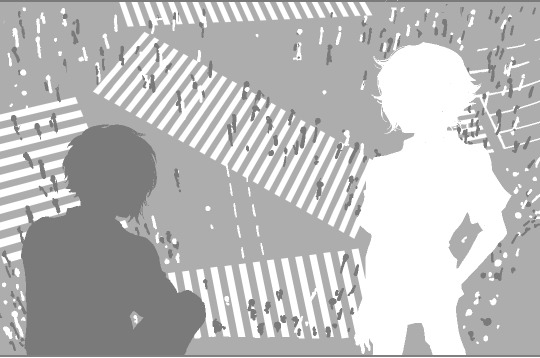
Hazuki only showed up for 5 minutes, but his presence is so vital and true to the game that I think he is the most memorable out of the new cast. The two Composers have such an intriguing bond, with their yin/yang or phoenix/dragon themes, opposite color design, the sempai/kouhai tone and the way they keep some sort of distance/work relationship as if it’s mandatory between Higher beings, yet at the same time they can talk so casually because they are truly equal – and different from one another. I have written a separate meta on them here.
Some people pointed out, that all Shinjuku characters’ names and themes are based off Hanafuda cards and the Phoenix in Hanafuda belongs to the Paulownia suit – which is Joshua’s name flower. This is so interesting because it feels like the creators somehow saw it as a sign to interweave the Shibuya and Shinjuku storylines together. Though it doesn’t come out much on the surface, it’s fascinating nonetheless considering both Josh and Haz had at some point interfered with the other town’s affairs.
“Shibuya tour with Haz” was such a special scene, as it happened between 2 characters who do not/no longer have a reason to care about Shibuya, on the subject of what is worth saving about Shibuya. Hazuki carried out the purification of Shinjuku and stepped in to restore Shibuya just as part of his job and unlike Hanekoma or Joshua who both possess profound understanding of humanity, he really didn’t know humans at all. Rindo’s irrational wish invoked in him a sense of curiosity, to try gambling on something irrationally and learning a bit of what his senior have experienced. With all the pieces put together, it provides an overview on Higher beings as a whole, and that Joshua and Hanekoma are really the odd ones out with Hazuki being somewhere in between them and the rest.
The old friends
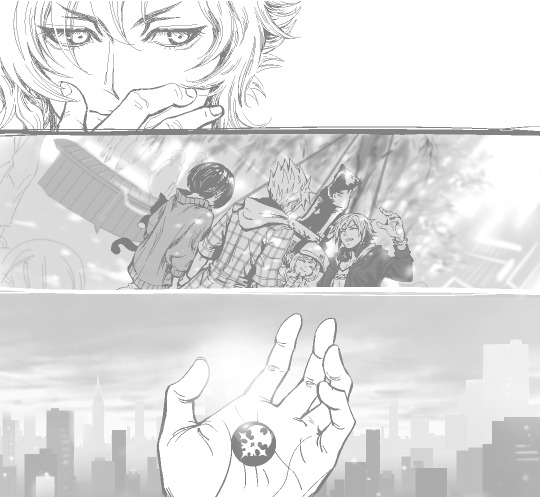
It’s easy to have returning characters overshadow the new cast as they have already matured out of their personal story arc and stayed in our hearts for all this time. In the end, I have managed to enjoy both the old and new cast separately and altogether, and they will both find their own place in our memory of this game for the long term.
Sho is truly as crazy as ever, the game wouldn’t be the same if Sho is any less of what he is. Sometimes it doesn’t feel like Neky or Beat is younger than Nagi at all, with moments when it seems like Neky has aged 14 years instead of 3 years. His friendship with Coco surprised me pleasantly, and their interaction together with Beat was fun to watch. Rhyme’s found a new dream and her friendship with Kaie is precious too, especially considering that she can still talk to him online after the game ended. Josh and Neku’s interaction suggested that they have resolved the past and are on equal terms now, they even parted ways in good spirit and I don’t feel any worry about them like I did before.
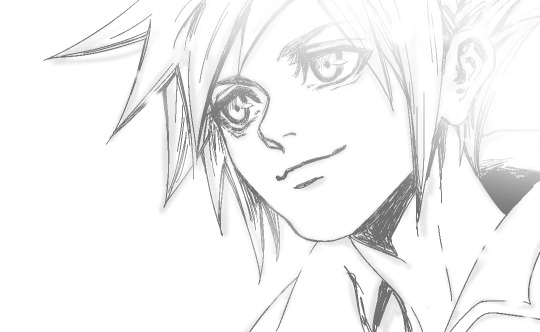
Neku and Shiki’s reunion scene was beautiful, theirs is such a special bond that it has grown and supported them even without being able to see each other. I am so happy to see them all again and that they stay true to who they are, albeit looking more grown up, cooler and happier than ever before.
Overall, NEO can’t become a classic on par with the OG, but is definitely a good sequel and a good game in its own rights. I’m happy with whether or not there will be a 3rd game to complete the 3 monkeys theme, but if there will be – I hope the creators can really find the time to learn from the last 2 games and start over with a fresh mindset and strong core.
#neotwewy#neotwewyspoilers#ntwewy#ntwewy spoilers#neo the world ends with you#twewy#review#meta#neo twewy#shoka sakurane#rindo kanade#tsugumi matsunae
181 notes
·
View notes
Text
The paradox of the relationship between Takeru and Hikari

The issue of the relationship between Takeru and Hikari has been a question of interest since the series first aired, and especially after 02, which prominently depicted them constantly hanging out together and clearly having some kind of relation to each other...and yet, strangely, very rarely having a real heart-to-heart or even talking to each other much at all. The constant juxtapositions of them standing next to each other all of the time in both the series and in external media, combined with the fact they’re so associated with each other in terms of being Adventure returnees and with Digimon partners with similar evolutions, makes one almost mentally geared to associate them with each other, and yet we never really get to hear what they think about each other in the entirety of Adventure or 02′s running.
Part of this is because Takeru and Hikari are the two most “difficult to read” characters in the 02 team -- Hikari because she compulsively suppresses any selfish or negative feeling she has, and Takeru because he covers up his problems with a smile and pretends everything is okay, until it’s not. And, as it turns out, that “gap in communication” exists between the two of them as well; in the web of 02′s relationships, it’s a strange mix between being “comfortable around” each other, and yet not truly knowing each other...
Disclaimer before we continue: With some exceptions related to unambiguous canon depictions, I try to write my meta about relationships between characters in such a way that both shipping readings and non-shipping readings are possible in most cases, and my main reason for this is that I very strongly believe that even if you do ship the pair in question, it’s rather reductive (and not very fun) to stop an analysis at “anyway it’s because they’re in love” or something and not go any further. If you don’t care for Takeru/Hikari as a ship, I hope you can take this analysis as-is, and if you do happen to ship it, I hope you can take my analysis of the gaps in their relationship as “things they would have to consider and overcome for such a relationship to be possible” (i.e. a possible fanfic prompt?) and not me trying to dismiss the ship as inherently possible or impossible.
A second disclaimer: A lot of the important key points below are heavily dependent on how they were presented in the Japanese version of 02, especially in regards to the key 02 episode 13. The American English dub took a very large number of liberties with a lot of the below aspects, so if you are reading this with only that version as a reference, please be aware that there may be significant differences for the sake of avoiding confusion.

Hikari didn’t get to spend much of the series with the rest of the Adventure group, having been a “latecomer”, but once she enters, it’s rather interesting how much Takeru doesn’t socialize much with her. Granted, part of this was because of the circumstances -- there was a lot to be done, and Hikari had a cold relapse not long after they’d entered the Digital World -- but you’d really think Takeru would be interested in at least socializing with someone who’s actually his age, and yet we don’t get any real depiction of doing so outside of discussing important matters. It’s not to say that they never had any kind of conversation offscreen, but by the time we get to the end of Adventure, we have zero scope of what they actually think of each other.
By the time we get to 02, it turns out that this is probably by design.
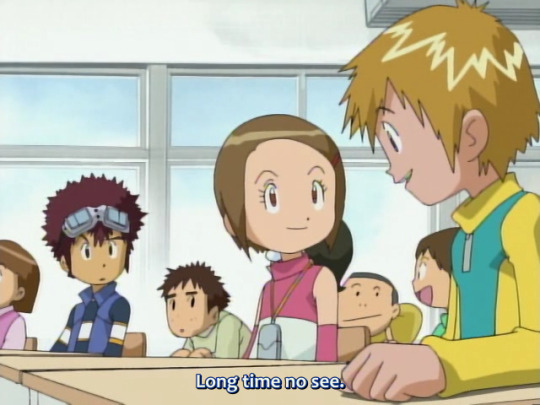
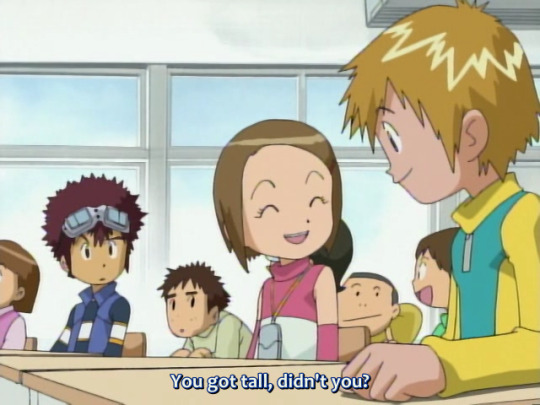
First of all, we very quickly learn that the two of them did not keep up between Adventure and 02 -- they’re meeting each other again for the first time in a long time, and the last time they did meet was when they were much younger (probably their last meeting being the one depicted in the flashback in 02 episode 27). This is understandable considering that, up until the beginning of 02, Takeru lived in Sangenjaya and not Odaiba, meaning that it wasn’t like they’d have opportunities to meet up much in real life either, but the point is that this is how little contact and how little involvement they’d had in each other’s lives up until this point.
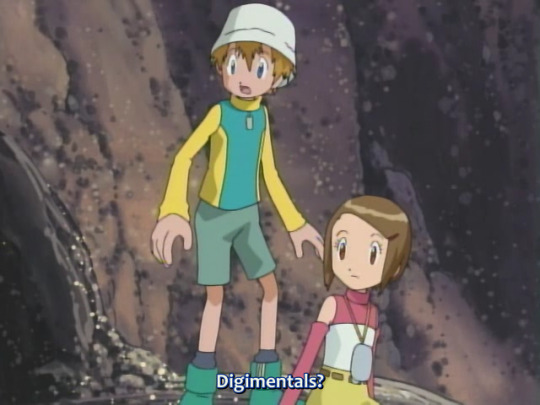
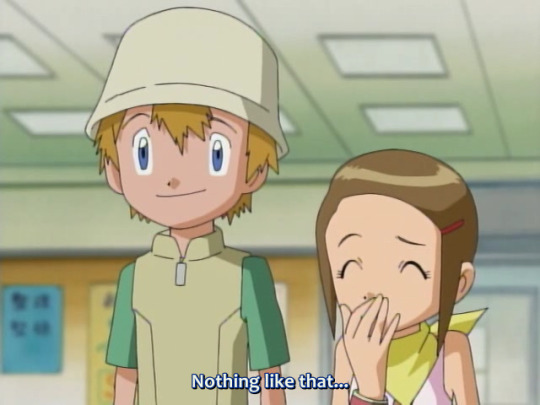
So, once the plot of 02 kicks off and the two of them become active as Chosen Children again, the two of them end up hanging out a lot. So much that Daisuke starts accusing them of having something between them. And the two of them never say anything to really firmly deny him, which of course only makes him more confused and upset, until 02 episode 17, when the concrete connection between them is established to the rest of the 02 team, and it’s properly disclosed that they were part of a whole adventure back in 1999 together.
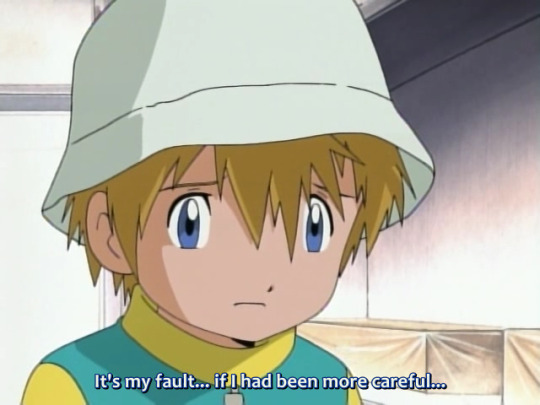
Takeru knew Hikari before, and she’s still the one he knows the best out of this team, and on Hikari’s part, Takeru understands the nature of “being a Chosen Child” in ways the others don’t, and both of them had that formative experience that the others don’t understand. But 02 is a series that’s not only about relationships, but also about the differing nature of relationships -- it’s true that, having known each other well beforehand and also being all-around decent people, the two of them would certainly have an extra level of investment in each other’s welfare, but...
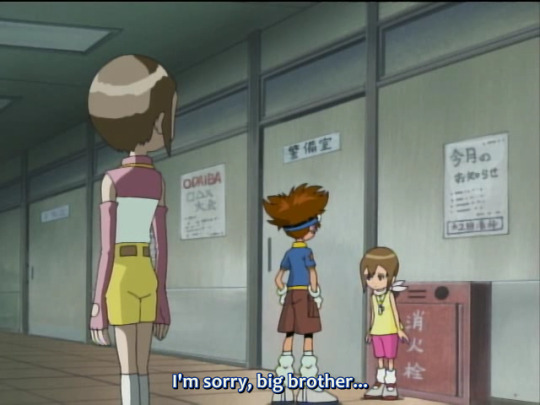
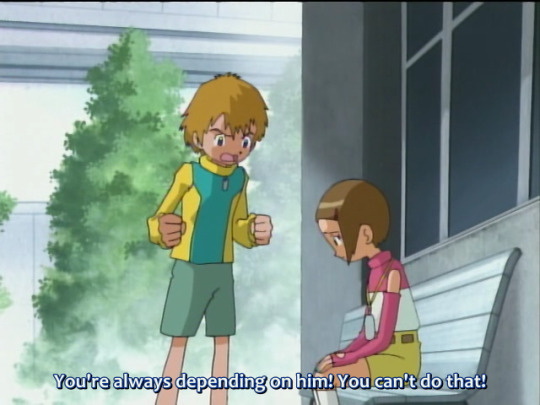

In 02 episode 13, we learn that as much as Takeru knows Hikari, he doesn’t really know her, and on Hikari’s part, she’s still incapable of communicating the extent of her thoughts so that he can.
The conversation between Takeru and Hikari behind the school in this episode is the first time we get to really see an opportunity for the two of them to bare their actual emotions, but nothing that can be called a "conversation" is had between them. Hikari is still plagued by a compulsive desire to not be a burden to others, including the idea of “burdening” her brother, and, when Takeru finally prompts her on what’s going on, she says nothing that properly clarifies what she’s going through, nothing but a cryptic mention of the “sea”, a statement that she "might be going away”, and a reference to her brother having always protected her beforehand. Takeru takes it as a sign that Hikari’s become overly dependent on Taichi, and snaps at her angrily -- a persistent symptom of him being unable to regulate his emotions properly -- and, unable to handle it, runs off awkwardly, leaving her alone to eventually be taken away. Later in the episode, Takeru reflects that he’d basically just doomed Hikari by his own actions, and with his last words to her having been something awful.

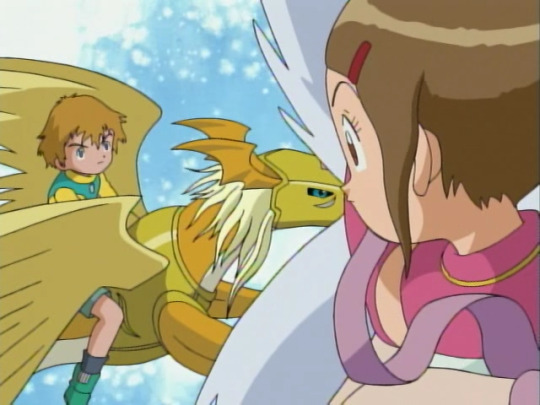
Ultimately, some degree of progress is made in that Hikari realizes that Takeru reaching out to her earlier makes him someone she should be reaching out to for help -- in the end, nobody in the 02 group had yet been able to reach out to her emotionally because of how closed-in she was, and the only people she truly trusted with her feelings up until that point were Taichi and Tailmon. So in other words, Takeru is another person she can finally “trust” with her feelings and welfare. But while Takeru is finally able to connect to her in some sense with this, when the two finally close off the episode and return to the real world, everything ends in complete silence. They do not say a single word to each other. They’re getting by with a sense of “inherent trust”, and their disconnect was resolved with that alone this time, but this problem hasn’t been fully solved yet and will be rearing its ugly head again by the time we get around to the Jogress arcs.
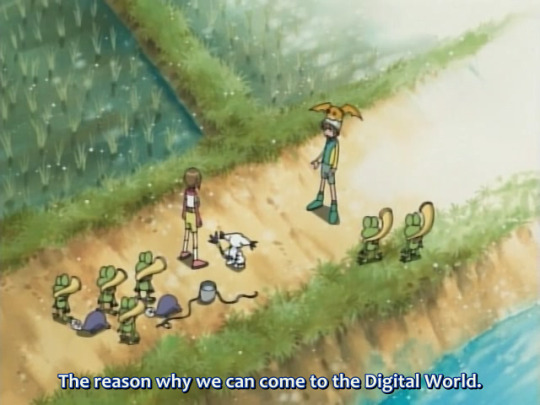
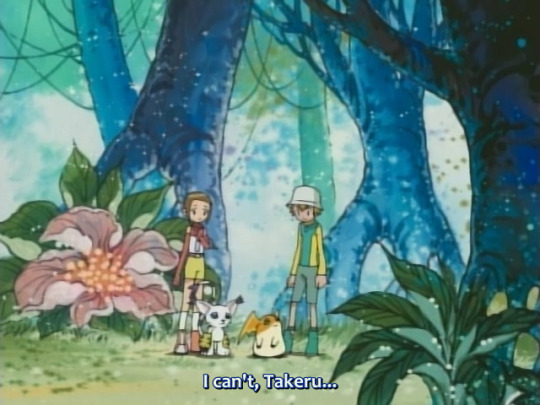
And so the two of them return back to their “comfortable with each other” status quo -- but, again, 02 is a series that portrays relationships in a very multi-layered and multifaceted form, and being comfortable around someone still doesn’t necessarily merit emotional closeness (for instance, Ken was pretty clearly indicated as being “comfortable” and straightforward in terms of working with Miyako in 02 episodes 25 and 33, but there’s no doubt that Daisuke’s the one who was more properly addressing the things he emotionally needed most at the time, which could arguably be said to be exactly why Ken was having a hard time adjusting to him at first). We see them “go off together” to do...completely mundane and practical things, like discussing why they’re still able to come to the Digital World in 02 episode 22, or trying to have their Digimon partners evolve on their own in 02 episode 24 -- they’re not having any kind of emotional heart-to-heart, they’re just there.
When you look at the wider picture, you can see that Hikari and Takeru’s relative comfort around each other at this point is largely because they’re still not comfortable being alone with anyone else yet. So far, they kind of had a bonding (not really bonding) session back in 02 episode 13, and they hadn’t had anything of the sort with anyone else, and they’re still the only people who understand certain things relevant to the adventure in 1999 that the others don’t. They’re both still ridiculously closed-in and guarded, and not trusting anyone with their feelings -- they can’t even trust each other with their feelings -- so they’re getting by on hanging out with each other because it’s either that or go off to be completely alone. As the two most “emotionally isolated” people in this group, there’s a wall between them and the others, and that wall is only slightly thinner between each other -- and you can even imagine that they’re willing to hang out with each other because they won’t be bothering that wall and causing intimidation.

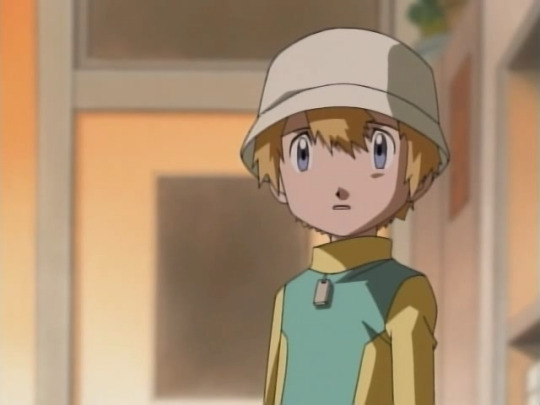
And by the time we roll around to 02 episode 31, we learn that, this whole time, nothing has improved. Takeru sees that something is going on with Hikari, but does and says nothing -- perhaps because he’s not sure what to say, perhaps because he’s afraid of lashing out at her again, whatever it is -- but he can’t and won’t speak to her nor address her feelings.
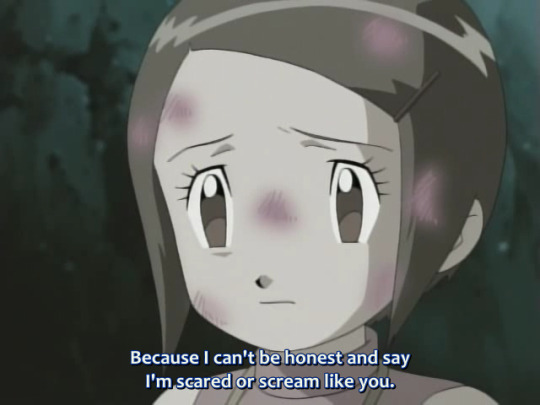

In the end, the person who does establish that ability to “communicate” with Hikari is not Takeru but Miyako -- an aggressive, in-your-face, overly honest person who gets straight to the point and refuses to hold back, whose messy personality causes Hikari to become assertive in handling her and allows Hikari to finally vocalize one of her truly sensitive feelings, and who’s able to use her immense emotional sensitivity to identify what Hikari needs and break through to her.
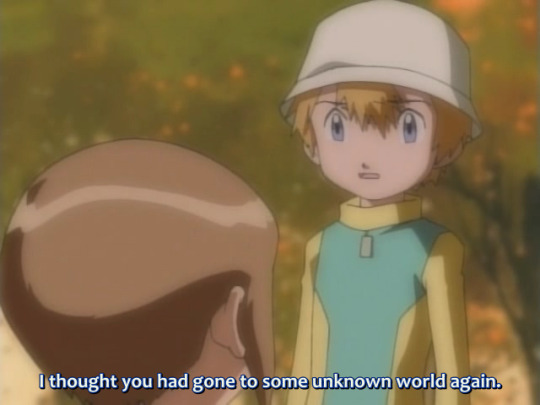

But just because Miyako ended up being the person Hikari needs to move on past this issue does not mean Takeru’s role wasn’t important, nor that Miyako coming into Hikari’s life means that all of her relationships are inferior or pointless -- rather, a recurring element of 02′s portrayal of relationships is that everything has a ripple effect, and that “opening up” one person’s heart allows them to open up to others as well (see how Daisuke reaching out to Ken eventually helped him reach out to the others in the group, how even in this very same episode Miyako expresses that this experience helped her understand Ken better as well, how Daisuke’s experiences end up giving him a healthier relationship with the rest of the group, how Iori and Takeru’s Jogress ordeal helps them both become better at reaching out to Ken...). Unlike how they’d both closed off 02 episode 13, Hikari and Takeru end this one by talking -- with Hikari’s newfound confidence from her dealings with Miyako allowing her to more openly speak what she’s thinking with Takeru.
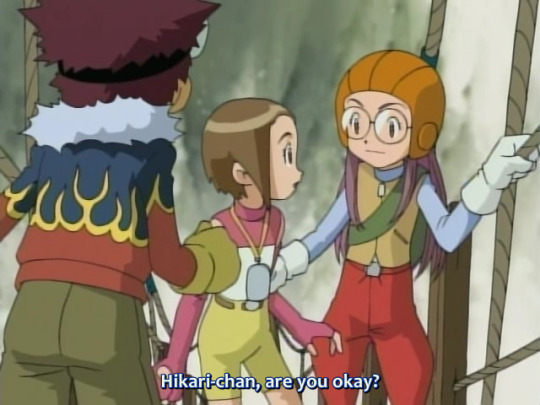
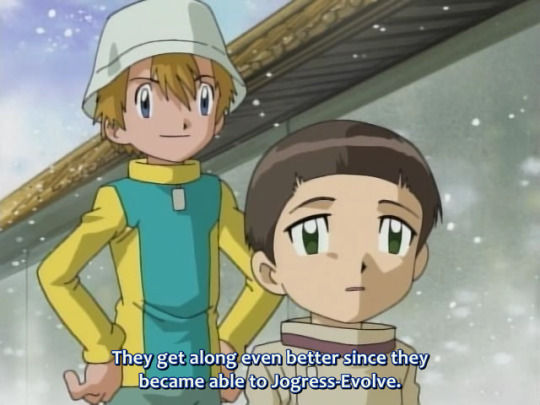
One thing you might notice is that after 02 episode 31, Takeru and Hikari are never seen going off on their own together for the rest of the series -- because, again, their “latching” onto hanging out with each other at the exclusion of anyone else was because they were that isolated from everyone else, but not anymore! Hikari starts to hang out more with Miyako as the two of them become more comfortable hanging out after the events of said episode; after all, Miyako had come to understand the real reason why Hikari “keeps so much inside” and that she needs to actively reach out to her, and Hikari is able to properly trust Miyako with her feelings, meaning that now that Hikari is starting to open up, she doesn’t need to fall back on her “truce” with Takeru to get by. Which ends up leaving Takeru rather alone for the following set of episodes. Well, seemingly alone, but...


...he’s not truly alone, because this is also where Iori realizes that there’s a lot more going on with Takeru and that he needs to make a proactive effort to understand him, and it doesn’t take long for Takeru to realize what Iori’s doing (especially when Yamato tips him off that Iori asked about him in 02 episode 35). Once again, very much unlike Hikari, Iori is straightforward and to-the-point, and is much better at cutting through all of the complicated layers Takeru puts up in an attempt to cover up his emotions.
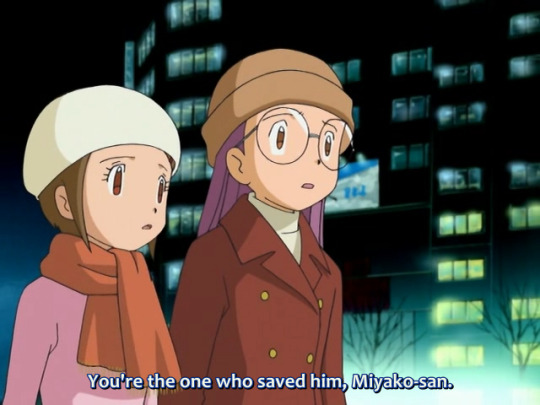
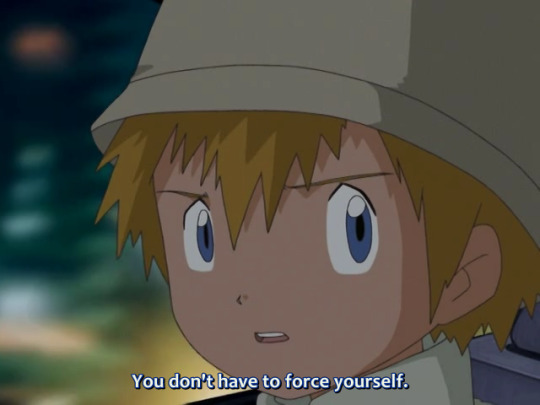
The rest of the series has them in significantly more emotionally tense situations than before, and while the fact they end up spending the rest of the series with their respective Jogress partners instead of each other is partially sheer pragmatics, it’s also how the two of them start taking a more active role in actually checking on the others’ emotions and communicating with them in regards to their feelings. This is a huge deal -- compare this to back in 02 episode 13 when they were practically the only people willing to have this kind of serious, emotional conversation with each other -- and said attempt at a serious conversation exploded in their faces. (The other time one of them had made an attempt at something vaguely resembling a heart-to-heart during that time was 02 episode 11, which also resulted in Takeru blowing up explosively.) But here they’re capable of communicating clearly and openly and making their positions known in a way that gets through to their respective Jogress partners’ issues, without being stifled by anything.
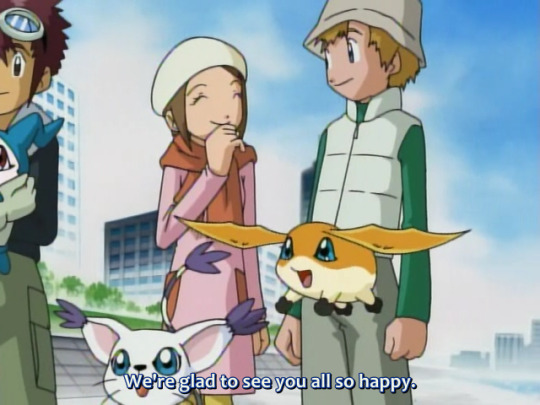
But, again: just because they don’t “go off together” anymore doesn’t mean they stopped being important people to each other or comfortable around each other -- it’s just that now they’ve stopped wandering off together for the sake of blocking themselves away from others, and no longer trapped in this strange, paradoxical relationship of knowing-but-not-truly-knowing each other they had all the way back in 02 episode 13. The relationship they had back then was something built off of coping mechanisms, and not something you could truly say was healthy, not when their communication was stilted and Takeru had snapped at her so badly -- but both of them learning to open up more and be more honest with their feelings means that they may well have an actual healthy dynamic going forward.
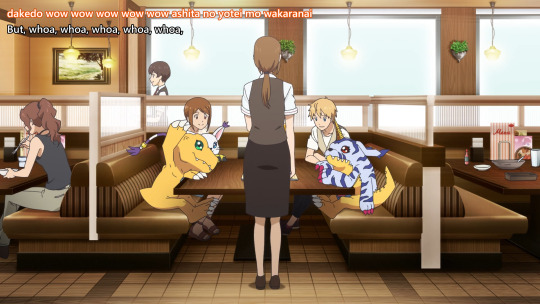
And for all it’s worth, we learn that they’re still on very good terms by the time of Kizuna, getting breakfast together in the opening -- but it’s left ambiguous if their reason for doing so like this was because they still have a penchant for particularly hanging out together, or whether it was just circumstance because they were free to get breakfast after the Digimon incident (they act independently for the rest of the movie). Moreover, their relationships with the others in the 02 group are still going strong, because as per the drama CD, Takeru’s happy to hang out with Daisuke like it’s nothing and actively join in to reach out to Iori (it’s said Daisuke was approaching Iori “first” despite Takeru being there, so both of them were hanging out independently and decided to pick up Iori together), and Hikari comes in with Miyako, expressing a very firm intent to hang out with her for their trip, and ultimately it’s established that them not being with the rest of the group at the time of the movie was sheer scheduling circumstance and not necessarily them going out of their way to operate away from them.
So in other words, whatever relation you can say they have at this point, or their ability to get along, is not based on them falling back on each other as an unhealthy coping mechanism of silence, but one carried out in a more genuine manner.
#digimon#digimon adventure#digimon adventure 02#digimon adventure last evolution kizuna#kizuna spoilers#takaishi takeru#yagami hikari#takeru takaishi#hikari yagami#shihameta
161 notes
·
View notes
Text
Books of 2021 - July
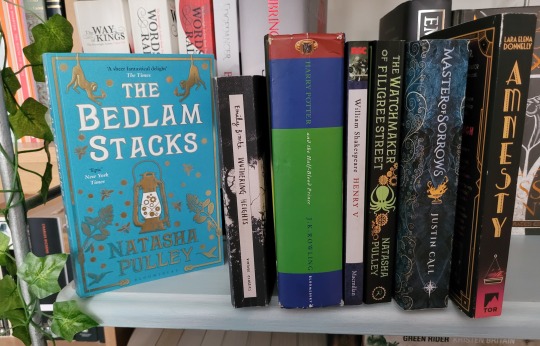
I read a lot this month! I’m not even sure how I managed it, especially when we consider I’ve read another 850 pages between Anna Karenina and Harry Potter and the Deathly Hallows on top of this lot!
I’m just going to apologise now for not proof reading this... I’m finishing this off at 2 in the morning to schedule and I’m sick of looking at my own writing at the moment.
Amnesty by Lara Elena Donnelly - Technically I read this at the end of June, however, I was on holiday so couldn’t include it in last month’s wrap up.
I’ve already spoken about the Amberlough Dossier and anyone who’s been around my blog for longer than about 10 seconds knows I love this trilogy. Amnesty was no exception. We have the return of Cyril, he and Ari working through their relationship (or not quite understandably), and the fall out from the fall of the Ospies - this world’s equivalent to the Nazi party. It’s not an easy book to read and the glamour of the first installment is completely stripped away to deal with very complex moral and political questions. I don’t necessarily agree with Donnelly’s answers, however, I do admire her for really delving into these very difficult topics. She used the speculative nature of the Amberlough Dossier to come up with a sensitive and interesting discussion on a very difficult period in history.
I’m hoping to write a proper review for the whole trilogy at some point (once I’ve finished the monstrosity that is my Words of Radiance review) so I don’t want to say too much more here. However, I do want to say I really enjoyed that Donnelly found the space to continue looking at the smaller, private, and interpersonal consequences of the Ospies’ regime, particularly for families. It’s a sensitive look into this situation and I loved every second of it - I also adore Cyril and Ari’s relationship, but I’ll dig into them in my proper reivew.
Master of Sorrows by Justin Call - this was a slightly underwhelming read for me, although I did really enjoy it. I’ve seen Master of Sorrows praised everywhere, I don’t think I’ve seen it given less than 5 stars? Yet, for me it was a solid 4 star read. I’d wanted a 5 star read (I’ve been sorely lacking them) but something was holding me back with this one - I do think the series has 5 star potential though and I’m going to read Master Artificer soon!
This is a book clearly embedded in a love of mythology and fantasy. It’s dark and gritty, especially in the second half, with plenty for the reader to sink their teeth into. I’ve also never seen such a strong focus on physical disability in a fantasy novel - it was refreshing to see and led to an interesting use of the magic system to develop ways of overcoming physical disadvantages. Although I’m hoping this is going to be explored further in later installments as, for a large part of this book, Annev was essentially able bodied due to a magical prosthetic he never takes off.
Unfortuantely the most interesting part of this book, for me, was the mythological world building at the start of each part in the book. The myths, clearly based on Norse mythology (I’m sorry but “Odar” was a bit obvious), were fascinating, particularly as they started to have an influence on the events of the main narrative. I just wanted to know more about the gods than the actual story, this is probably a me issue though... The main plotline felt generic: Annev is a boy in a coming of age story, complete with a magic(ish) assassin school, a wise old mentor, and a destiny/prophesy surrounding him. It’s a typical fantasy story, so far, and while I do really enjoy these plotlines (I read enough of them!) it’s not exactly the most original. Nevertheless, I am excited to see where Call goes with this as I do think the rest of the series will start growing into something much more interesting and I look forward to Master Artificer.
Wuthering Heights by Emily Bronte - this is one of my favourite books of all time, we all know this by now... See my full review for Bronte’s masterpiece here.
The Bedlam Stacks by Natasha Pulley - July has been the month of Natasha Pulley for me because I’ve rediscovered just how much I LOVE her books. I first read Pulley back in...what, 2017? (It’s been a while...) with her debut novel, The Watchmaker of Filigree Street which I remember loving, but I never continued with The Bedlam Stacks, the only other available book by Pulley at the time. To be frank with you, it’s because at 18/19 I wasn’t that interested in Peru. However, I now really want to read The Kingdoms, Pulley’s new release, but I felt obliged to read the books I already owned by her and hadn’t read - so I picked up The Bedlam Stacks as it’s the one I’ve owned the longest without having read it...
Not reading The Bedlam Stacks back then was the best decision I’ve ever made because I know at 18 I wouldn’t have appreciated what a stunning masterpiece this book is - it would have flown over my head because, at the time, I just wanted more Thaniel and Mori. At 23 I ADORED this book. I absolutely fell in love with the subtle whimsy and quite, understated beauty of this story. Pulley has such an elegant way of writing, it’s never overdone - she has a way of playing with words which reads beautifully but doesn’t feel like too much. She’s never flowery or purple with her prose, but she does create a work of art.
Unfortunately, The Bedlam Stacks is a book I think a lot of people may struggle with - there’s not a lot of plot, everything is a bit weird, and it’s largely a character study for our two main characters: Merrick Tremayne and Raphael. Merrick’s journey to Peru to find quinine - a cure for malaria - for the British Empire is really a set up to allow the rest of the book to focus on these two characters. It’s centred on the very slow development of their relationship together, coming to understand each other, and eventually open up about themselves - well this is more in Raphael’s case. It’s a poignant story about two people finding a home with each other that will endure across time and distance - it’s not quite a romance, but it’s certainly more than a friendship. Personally I read them as ace, but there is definitely scope here to read them in a variety of other ways depending on your own experiences. But what is certain is their deep connection, and that their love (platonic or otherwise) is what drives the outcome of this story.
It’s beautiful, poignant, and slightly tragic when you think about it... I loved every minuet of it and just wanted the book to continue, I was genuinely sad it was over! It’s not a novel for everyone, and I do think the opening section needed some more work as it did feel like Pulley was saying ‘lets get over this necessary but boring set up’. However, it was exactly what I wanted and I’m so happy I’ve finally read it.
I’m also much more interested in Peru now, so that’s something else to hold in it’s favour!
The Watchmaker of Filigree Street by Natasha Pulley - I’m falling slightly out of order here but it seems better to continue with Pulley’s books. Most of the same praise I gave to The Bedlam Stacks can be repeated here - Pulley’s writing is slightly weaker here but it’s only really noticable because I read both books one after the other and I was thinking about her prose. The same whimsical, poetic, and understated style is used in both books and it really suits the type of stories Pulley like to tell - and again it’s a style that really works for me.
The Watchmaker of Filigree Street I think is a slightly more universally likeable story - although I would argue Pulley is an acquired taste. There is a bit less whimsy, and the relationship between Thaniel and Mori is more easily quantifiable for readers. There is also a more obvious plotline to follow, whilst still developing three compelling characters with Mori, Thaniel, and Grace. Personally I don’t love Grace - I find her brash and callous - however, she does have as good of an arc as Thaniel and Mori, she’s also someone who regularly get overlooked when people talk about this book. She’s not someone I like or approve of, but I do really understand where she’s coming from and can appreciate her growth. Pulley doesn’t need us to like Grace - or any of her characters - she presents them as they are and lets us cast our own judgements on them, and I sincerely love this about her. (I’m also so up for reading more about Grace and her relationship with Matsumoto, they’re fabulous together!)
The main draw to this book is definitely the relationship between Thaniel and Mori - how could you not love them? They’re fascianting to watch - together and separately - and throughout the course of this nove you really feel them grow into their relationship. It’s beautiful to watch and feels genuine. Their bond is earnt, not just presented to us as a fact. However, what I really love about Mori and Thaniel is the slightly sinister route Mori takes to make sure he meets Thaniel. Honestly, in any other book Mori would be horrifying with his slightly callous use of his abilities to manipulate the world around him to achieve his own ends. However, with the narrative framing here he’s slightly toned down, it’s a spectacular example of framing shaping audience perspectives on a character. It’s great and I appreciate the sensitivity Pulley used to shape Mori and the relationship between him and Thaniel. I’m also really looking forward to seeing how they develope in The Lost Future of Pepperharrow.
Henry V by William Shakespeare - I don’t really have a lot to say about Henry V... I’ve never felt that strongly about this play - it’s fine? It’s a FABULOUS play to watch (I’ve partial to the Tom Hiddleston version in The Hollow Crown) but to read it’s merely okay. There are some fantastic and very famous speeches - and I absolutely adore the Chorus. However, as a whole the play is merely a decent one. I’m always left a bit uncomfortable with how Shakespeare treats the French, and I’m yet to work out where I stand on Henry as a person and the morality of the war... It’s something to ponder and maybe write something on at a later date.
Unfortunately, this one falls into a similar issue as the Henry IV plays - I just don’t like the common men plotline within this one... It’s slightly better because Falstaff isn’t in this play, except in name (I have an absolute burning hatred of Falstaff... Like we could burn him out of English literature and I’d dance on the ashes level of hatred, it’s perhaps sllightly irrational but I loathe him. I’d otherwise like the Henry IV plays but I see Falstaff and I’m immediately full of seething rage. It’s apparently very funny for my best friend.) However, I just find the common men a tedious distraction from the rest of the play. I switch off whenever I’m watching the play and they’re on stage/screen. I know why they’re there I just don’t care - it’s a me issue, I’m well aware.
Harry Potter and the Half-Blood Prince by J.K. Rowling - okay I’m not going to write much on Half-Blood Prince as a whole becasue 1. Rowling herself, and 2. I’m going to rank the Harry Potter books when I’ve finished with Deathly Hallows. Overall, I loved this book, it’s always been one of my favourite Potter novels and my reread only cemented its place. The plot is genuinely interesting and well thought out, it’s one of the best books for exploring Harry as a character (I adore seeing his darker side!), and the set up for the finale is excellent. I actually perfer it to Deathly Hallows because the promises it makes are more interesting than the actual execution of the book.
However, I do want to say that this book made Snape my new favourite character - I won’t explain why yet, I need to do a full spoiler discussion of ALL the Harry Potter books, including Deathly Hallows. But Snape is by far the best drawn character in the Potter series. He’s certainly not the nicest, kindest of most likeable. Snape’s not a moral paragon, neither has he ‘done nothing wrong’ as I’ve seen argued. But he is the most interesting and morally complex.
Everytime I’ve read Potter before, Snape’s a character I’ve not really thought about - which is shocking considering how much he’s in these books, the role he plays, and the discourse around him in the Harry Potter fandom. I’ve always just gone along with the face-value presentation of his character. Yet on this reread I’ve paid attention to Snape, not deliberately, it just naturally happened. Anyway, to cut a long story short - Snape is my new favourite character! Yes Lupin is still my irrational, undying favourite. But, in terms of having a genuine interest and reason for loving him Snape is my new favourite because he is so complicated! He’s someone I’ve come to understand and sympathise with. I don’t condone Snape, I still think he’s a piece of work who should NEVER be allowed around children. But he is a good person. Again not nice, likeable, or morally sound. Yet he does spend the best part of 20 years working tirelessly for good without praise, acknowledgement, or recongition.
He’s a fascinating character and I’ve adored diving into his mind, as much as you can in this very Harry-centric series, without the accepting bias of a child’s eyes. Snape’s one of the few characters in Harry Potter I’d like to read a book about - I’ve neber been one to want a Marauder’s spin off or Hogwarts founding story. But I think diving into Snape’s mind would genuinely be worth it and an interesting experiment, I just don’t think J.K. Rowling would be the right author to do it.
#books of 2021#reading#mini book reviews#amnesty#lara elena donnelly#master of sorrows#justin call#wuthering heights#emily bronte#the bedlam stacks#the watchmaker of filigree street#natasha pulley#henry v#william shakespeare#harry potter and the half-blood prince#harry potter#severus snape
7 notes
·
View notes
Video
youtube
This time on Great Albums, we tackle a slightly more obscure artist, but one who’s near and dear to my heart: Frank “Fad Gadget” Tovey, the very first artist signed to Mute Records, and the one behind MUTE 002. Find out what’s so great about him by watching my video, or reading the transcript that follows after the break.
Welcome to Passionate Reply, and welcome to Great Albums! Today, I’m going to be digging into the work of Frank Tovey, better known as “Fad Gadget.” While Tovey was the very first artist signed to Daniel Miller’s Mute Records, his legacy doesn’t seem to be remembered quite as strongly as many of his labelmates. He never achieved the heights of pop stardom that Depeche Mode did, and despite being a daring and experimental artist in his own right, he doesn’t have quite as prominent a cult following as, say, Einstürzende Neubauten. Fad Gadget may not be for everybody, but he’ll always be an important artist to me. As a teenager, he helped me bridge the gap between listening almost exclusively to mainstream synth-pop, and becoming much more interested in underground styles like industrial. And my first love was this album, Tovey’s third: Under the Flag.
Tovey’s first 7” release, featuring the tracks “Back to Nature” and “The Box,” was released on Mute Records in 1979, as MUTE 002, second only to Daniel Miller’s own “Warm Leatherette.” His early singles, as well as his debut album, Fireside Favourites, stuck to a similar sonic template as “Warm Leatherette”: sharp, punkish assaults on common decency, propelled by a harsh synthesised pulse or two. But for his second LP, 1981’s Incontinent, Tovey went in a different direction. He maintained his bile, and impatience with the societal status quo ante, but assumed the guise of a Medieval fool, and incorporated a substantially larger proportion of traditional instruments into his sound.
Music: “Blind Eyes”
For his follow-up to Incontinent, Tovey would straddle the line between gritty, industrial synth lashings and that counter-cultural dark cabaret. And sometimes, he’d even do it within the same track, as on the fearful “The Sheep Look Up.”
Music: “The Sheep Look Up”
On “The Sheep Look Up,” a sparse, piano-driven intro unfurls to reveal a menacing electronic undercurrent. But the piano doesn’t depart from the track--in fact, it keeps up with the pace just fine. As jarring as the synth’s entry feels initially, it’s never the only source of tension in the track. Like a lot of great electronic music, Under the Flag approaches technology with nuance. While it’s one figure in the album’s bleak, dystopian landscape, it’s far from the only one. The lyrics of “The Sheep Look Up” are much more concerned with criticizing mob mentality and mass outrage--not to mention the role of governments in stoking that outrage, peddling jingoistic nationalism and seething hatred of perceived enemies of the state. In a lot of ways, this is a tale as old as time, and one that’s as likely to be told alongside a lute as it is a synthesiser. Sometimes, tradition itself is the target of Tovey’s ire, as on the track “Plainsong”:
Music: “Plainsong”
“Plainsong” is named after one of the earliest forms of music in the Western tradition: the monophonic, Latin-language chants used by the Church in the Early Middle Ages, also called “plainchant.” The track sonically embodies the wearying effect of simplistic, repetitive chanting, with its choir of distorted voices that repeat the main chorus, and refuse to stay in tune or rhythm. The title would seem to lead us to interpret “Plainsong” as an indictment of religious indoctrination, in particular, but I think it can also be read more broadly. Aside from that title, the lyrics don’t actually mention religion in any concrete sense, which makes me inclined to interpret it as also applying to all the other ways society uses music and rhyme to instill its values into people. Who among us wasn’t raised with insipid sayings like “blood is thicker than water” or “curiosity killed the cat,” that reinforce social norms and squash independence of spirit? Religion, like technology, is only one of modern society’s countless rotten pillars. While Tovey doesn’t single out religion in “Plainsong,” he is clear about the victims of such brainwashing being “young ears.” Childhood is invoked several times on Under the Flag, but features most prominently on “Love Parasite.”
Music: “Love Parasite”
The titular “Love Parasite” is, of course, a human infant--though it’s insidiously portrayed as something monstrous. Those of us who dislike children might be inclined to read “Love Parasite” as a brutally honest portrayal of parenthood as a miserable, soul-sucking experience, and hence as a rebuttal of the societal expectation that everyone ought to have children. While I do like that interpretation, I think it’s also important to remember that the “Love Parasite” is a human being, too. The fact that so many unwanted and unloved humans are brought into this world to begin with produces a tremendous resource for those institutions like church and state to exploit. It’s precisely this relationship between vulnerable people and the apparatus of government that defines the narrative of the album’s title track.
Music: “Under the Flag I”
The title track of Under the Flag is actually split into two parts. The first half of it appears as the opening track, and the second half closes out the album. That makes it even more tempting to parse it as a summation of the album’s themes than a title track normally is! Rather than distilling the overarching ideas of the album in a more abstract way, the “Under the Flag” tracks drill down to the level of an individual, struggling to make his way in society. He’s one of those unwanted children who grows up without a stable home life, and ends up working for the government and trying to make a difference in the world...but failing. By giving us this singular protagonist, Tovey centers his focus on human suffering at the most relatable and personal level possible. And with the final line of “Under the Flag II,” and hence, the entire album, he asks us, quite pointedly, “Under what flag?”
Ultimately, “under what flag?” is the central question proposed by the album. It also seems to be the question being asked by its striking sleeve design, featuring a photo of Tovey by the famed Anton Corbijn. The first thing we notice is its bold, black-and-white colour scheme--perhaps a nod to the idea of black-and-white, good-vs.-evil style thinking, often favoured by demagogues and others who seek to mobilize the masses. But after a second or two, we quickly realize that while Tovey is a flesh and blood man, the flag he seems to be holding up is merely painted on the wall behind him. It’s an image that perfectly epitomizes the contrast between the arbitrary, superficial nature of concepts like nations, and the painfully real human suffering that they can cause. Throughout the album, Tovey pits these abstract notions of communal well-being against the plight of the individuals they victimize--as on “Scapegoat,” a track centered around the perspective of the one person who’s saddled with the blame of a whole society.
Music: “Scapegoat”
After the release of Under the Flag, Tovey went on to release one more album under the name Fad Gadget: 1984’s Gag. He then released several albums as Frank Tovey throughout the remainder of the 1980s, first heading in a more synth-pop direction, and ultimately ending up releasing a full album of folk music, 1989’s Tyranny and the Hired Hand. While perhaps initially perplexing, I’ve always thought it was a natural move for Tovey. He was clearly interested in the exploitation of the underclass, and the expression of their fundamental humanity. And those themes are truly timeless.
Music: “Sixteen Tons”
Sadly, Tovey wouldn’t get a chance to re-emerge in the 21st Century, as many of his contemporaries did. He died in 2002, aged just 45, due to a congenital heart defect, while fresh off of releasing a new greatest hits compilation and supporting Mute labelmates Depeche Mode on tour. I can so easily imagine Tovey thriving in the present day, with the rediscovery of so much underground 80s synth in the 00s, and the impact that that had on electronic music--not to mention how he would react to our era’s tumultuous politics. To me, he’ll always be the artist I’d bring back around for one last release if I could.
At any rate, my favourite song on Under the Flag is “For Whom the Bells Toll.” Admittedly, this is a somewhat sentimental pick for me, since it was one of the first Fad Gadget songs I heard and really liked. It’s got clattering mechanical percussion, harsh, textural synth swipes, and, boldly enough, no actual bells. In the context of the album, it stands out for being a bit straightforward, thematically, with a narrator simply pining after a lost love--presumably one who’s deceased, given the title. But what I think really sets it apart is its less-than-conventional vocals. Besides some singing, and a bit of background yipping and howling, we also hear some disgusting, dry retching noises, and even a very hi hat-like sneeze. It’s one of the most memorable instances of Tovey’s artistic preoccupation with our lowliest bodily functions, which, considering the scope of his career, is quite impressive. That’s everything I’ve got today--thanks for listening!
Music: “For Whom the Bells Toll”
#music#great albums#album review#album reviews#fad gadget#frank tovey#industrial#industrial music#mute records
19 notes
·
View notes
Note
Now that She Ra is over, what are your thoughts on it? What about that Catradora kiss?
Hi Anon! Thank you for the Ask!
ヽ(*⌒∇⌒*)ノ Where to start?
I have so many thoughts on the show, and I’ve had so many thoughts since season 1. I’ve not written much of anything about She-Ra because I keep coming back to this problem of ‘where to start,’ or how to structure my thoughts beyond a +1000 item list. I can’t even pick one or two thoughts to dive into, because they all end up connecting to everything else —> honestly, that’s the mark of a tight narrative, even the big pieces that can fully stand on their own are still leading through to another piece. I fail at every attempt to write something brief.
Section I: Short answer first.
I have a very short and subjective list of media where I not only love (for different reasons) nearly every character (main, secondary, background), but where I also feel that their individual places or moments or arcs concluded in a way that felt right from start to finish. It’s a short list of media where connections and conflict between characters never felt forced, out-of-place, out-of-context, or done for shock value. She-Ra and the Princesses of Power makes that very short and subjective list.
It’s not often that a story hits all the right notes with me, and it’s much more often that a story starts off strong like that, and then turns me off ½-⅔ of the way through. I’ve quit video games during the final boss fight because the story lost me in the lead-up and I wasn’t going to waste 10-20 minutes of my time for something that turned out to be ‘meh’. It ain’t got to be deep, or anything either.
I really loved the voice acting. Everyone is great. A post for another time.
I love the aesthetics, which I wasn’t sure of at first teasers, but won me over in less than 3 minutes of the first episode (season 1) because I love bright pastels, the character designs are fun (can I still gush over variety of body types? YES), so many opportunities to explore stylish takes on the characters, and those Moebius-inspired scenery/background designs are a special interest delight. Season 5 delivered a visual ‘end game’ for the aesthetics in many ways, Section III further down will get into that a bit.
Section II: “What about that Catradora kiss?”
I gotta preface this with, shipping is not my go-to for how I enjoy creative works. It’s not a hobby for me. Sure there’s a few I dig more than others, but I’m otherwise agnostic about ships, unless there is a really bad story-fit (and that’s usually a subjective thing), or involves tropes that are a deal-breaker for me (and those typically relate a lot to the story fit).
With that said, I’m really happy to see Catradora be pulled off so brilliantly, and I think the kiss is a bold and beautiful big deal in a way that might not be obvious when considered in a vacuum. I see it as passionate and heart-felt, but also, it’s achieving(?) a relatable outcome (for me at least) that’s hard to describe. It’s an outcome yielded by a story in which two women—a hero and a villain—are divided and fight bitterly and then reconcile through love, while fighting a purity cult whose founder-prophet-god-king forces subservience through a conversion designed to strip someone of their identity (e.g. names they’ve chosen for themselves), memories-and-motivations, and love for others.
Despite these conversions, love still remains, it can’t just be baptized or therapy-ed away. Controlling puritans and authoritarians wielding religion or peace-panaceas as a weapon have been the villains in the lives of countless women and LGBTQIA people for a very long time. So yeah, I’ve got some feels about that. The last time I felt anything similarly relatable, or as strongly, was the Utena and Anthy relationship in Revolutionary Girl Utena (and really, their kiss during the surreal sequence at the end of the film adaptation).
Section III: Thoughts on Cult Aesthetics and Clones (the rough cut)
(1) In the future scenes at the end, Adora’s white dress with gold tiara and accents have this kind of goddess-like or Pallas Athena feel to it, which is a great mirror of the design choices for the god-like Horde Prime, his Purity Space Cult, mechanics/ship, and flagship interior scenery. Not saying that was the intention, but that’s how it came across to me.
Of course, those colors would be used because She-Ra already wears white and gold with a bit of red accent, which complement how the princesses are bright and colorful (pastels and jewel tones). The bold and bright colors helps signify that Etheria is full of life. Etheria is verdant and magical, and that sets up a contrast to the Fright Zone and the darker colors found in Horde characters (Hordak, Shadow Weaver, Scorpia, Catra, Entrapta, etc).
So the first kind of contrast was with the Fright Zone standing out as a poisoned/toxic against the bright, lively colors of Etheria and the princesses. Season 5 introduces another take on that contrast as Horde Prime is the opposite, or antithesis of Etheria’s colorful life. He’s like anti-life with his shades of light-and-dark grays on white, and only glow-green as an accent. In some cultures and religious traditions, white is associated with purity, and in others it is associated with death.
When Horde Prime ‘purifies’ Hordak for the sins of individuality and emotion (emotion for others, for his own sake), Hordak is drained of the colors he chose for himself during exile. In addition to being a contrast to Horde Prime (and informed by the 80s cartoon design), Hordak’s dark blue (or blue-black) and red color palette reflects the traditional use of red as a color for evil (especially vampirism) from back when diabolism was a stand-in for ‘the Devil’ in many forms of visual media (comics, live-action, animation, etc). In place of diabolic red, Horde Prime has toxic glow-green.
I absolutely love the use of the glow-green accents. Color trends for villains and significations of evil come and go, and I’m glad to see the color green be used again, and used so well. The last time I saw that shade of glow-green used so well was in Sleeping Beauty (re: Maleficent’s magic and the orb on her staff) and as the Loc-Nar in Heavy Metal. In both films, there are connotations of evil as a poisonous and corrupting influence. Green, in the context of evil, almost always signifies poison (and sometimes envy). I also like that the glow-green color is used in ways that aren’t immediately saying ‘this is evil’, such as the green baptismal waters and flames from the purification scene, or the green amniotic protein fluid. The language of piety and trappings of the sacred can cloak a sinister purpose.
I don’t know if any of that was intentional, but Horde Prime feels like the perfect synergy of purity and death (which has additional connotations, but that’s a very personal interpretation).
(2) Horde Prime immediately gave me subtle cult vibes in his first cameo (Season 3), and the follow-through on that was perfect and exactly what I was hoping to see. The background music throughout the scenes aboard the flagship fits well (love the soundtrack), and has the quality of Ecstatic Experience without pulling directly from any specific religion. Horde Prime’s dialogue is a delightful bit of narcissism veiled with the language of piety.
A purity cult comprised of clone-brother-worshippers of the cult’s founder-prophet-god-king reinforces that narcissism and has all the fun-dark feels of shiny-techno-future-dystopias. It is also an interesting use of clones, especially in a story format that usually never has the time to really dive into the complexities of cloning. This is the sort of thing that you’d be more likely to see in a one-off episode of Star Trek: The Next Generation, rather than the basis for a greater scope villain, or multi-season nemesis. (and yes, Star Trek: TNG had an interesting clone episode)
Clones in science-fiction tend to fall into just a few tropes, and I generally dislike seeing clones show up in a story because the execution nearly always feels sloppy (in small ways or big ways). I did not get that feeling from She-Ra, where, the clones occupy the “cog in the machine” trope, but it is not their existence as clones that make them that way, it is the Will of Horde Prime that does. They are simultaneously expendable and sacred in their unity. It’s a nice flip on “stronger by working together” that Adora and the others have to learn (and struggle) to do.
It seems like, despite their religious programming, the clones have a little bit of their own personalities until Horde Prime ‘inhabits’ them to exert his Will. I’m trying not to read too much into it, b/c what comes across as ‘inhabits’ to me (especially with the religious/cult context), was probably meant more literal like described in the dialogue as a hive-mind control kind of thing. The first time it happens—to post-wipe/death Hordak—felt to me like a possession scene from The Exorcist, but without the kind of horror visuals that would scare both adults and children. The quick-and-subtle amount of body contortion and sound is still gross and creepy (because it should be), but it also reminds me of Ecstatic Experience in the form of speaking in tongues, or snake handling, or being a medium for a spirit. Again, I’m not saying any of that is intentional, but that’s how I see it.
(3) Finally, there is Entrapta, Hordak, and Wrong Hordak. Clones rarely get to be ‘humanized’ through friendship or romance arcs. I can think of a dozen or more robots that get to be humanized in that way, but can’t recall any clones that have (excluding doomed clones whose friendship/romance only existed for the sake of selling the tragedy of their death). Hordak gets death, renewal, and romance in a way that worked really well, and the totality of it is unique. I was a bit surprised that they could work in another clone—and I love Wrong Hordak—who pulls triple-duty as (1) comedy; (2) relevant to moving various pieces of the story along; and (3) more humanizing of the clones, which, again rarely happens as most stories take the easy low road when it comes to clones.
For Entrapta’s part, she’s never put in the position of giving up who she is (‘weird’ by many standards) for a romance. Her passion for technology is both an amusing double entendre at times, and integral to who she is. A romance for Entrapta does not replace her passion for technology, she can have both. Dating myself but, I came up in a time where most media (for children or adults) would rob a woman of her agency or passions during the resolution of a romance arc. Maybe times have changed, but it’s still nice to see none of that nonsense happening here.
31 notes
·
View notes
Text
Diving Further In
So just going deeper into this SVSSS rabbit hole. Still in earlier chapters because I work, but just poking around online again because again I really just like looking at Shen Qingqiu’s face and also Liu Qingge’s look isn’t so bad either.
But like I came across some stuff that’s spoilers for me and it said that they are a popular ship together? But like also a lot of people question if Qingge is straight which the author said and I found curious that a lot of people seem to dispute that? So then I looked more and it seems people are citing an extra story where the two of them go to fight some succubi in a cave. I read the story, and I don’t really see it myself? Like I can see how some people could read that it implies that he is actually interested in Shen Qingqiu and maybe a little jealous, but also I can also see how it doesn’t necessarily and also aligns with the author saying that he is straight. This isn’t to say that I want to kill anyone’s ship or anything, but just want to point out how what MXTX is saying isn’t exactly crazy either.
I’m not really sure, but I think it might be because I’m asexual myself so even my own experience going through life there’s a lot of things that maybe other people who aren’t ace interpret as more romantic that I don’t think so at all and it’s gotten me in trouble sometimes where I feel like I’m just having pleasant conversation with people but people think I’m flirting? I’m just being nice and talking? I don’t understand?
But just the same like even for me if someone says something that could possibly suggest that I’m involved in something or that I like someone even if I don’t, I still get flustered and blush because people are talking about my private life even if I don’t actually like the person. And then they become convinced that that’s the person I like because I’m blushing as we are having a conversation about if I like someone.
Like truthfully, in the 4th grade I had an interaction with a classmate that I had that I thought I had an amicable friendship with. During the first week or so of school a bee came into the classroom and landed on my desk and my classmate killed it for me and I was scared and eternally grateful, so at a later date later I gave him like a small gift or something as a thank you. My classmates thought it meant I liked him or something and I was VERY CONFUSED. I was literally just grateful for the help with the bee and he’s always been kind and helpful to me in class so I didn’t really think anything of it, and just simply you do nice things for people who are nice to you right? It’s a very simple and pure thought, but I learned from that experience and misunderstanding that normally people don’t do that for people who are just your friends. I think they also thought I did because apparently I was staring at him a lot when we were on a field trip, but like during the field trip he was also goofing around and jumping on the bus and stuff. How do you not look at someone making a ruckus?
So basically, in reading the succubus story, I kind of thought about something like that for Qingge. Like if I were him, I would be a little surprised also that the description sounded a bit like me and like I’m sure just as Shen Qingqiu is going through all the women he knows, Qingge is also running through all the people who knows that Qingqiu hangs out with and realizes that he is with him an awful lot. I’m somewhat serious as well, and even though I’m focused on getting the job done, it’s not like I’m not trying to look out for my friends and their interests so I’d want to still listen too to learn more about them as a friend and even to find out how I can be a better friend to them or like encourage them in the future. Plus like nothing else was happening in the cave, so you just get bored and listen to what's happening. Same as me on the field trip. Space out staring out the window or turn in the direction of the commotion on the bus.
I also think that part of Qingge’s alarm is that the succubus mentions that the person is his junior, and I think most people would normally exclude anyone who was a student or disciple of theirs. He probably didn’t even consider someone who was from a younger generation as he was running through the list of people in his mind, and the description does sound like him and to me it reads like because he is straight and doesn’t think of his friend in that way exactly, he’s having a kind of panic attack and questioning himself internally trying to discern if it is him and his own feelings. But at the same time, he doesn’t want to say any more or explain himself because its not like he wants to be mean to his friend either.
Like I’ve had times like that too where people apparently maybe liked me, but I just didn’t like them that way or I was emotionally unavailable because I liked someone else. And then when you’re in grade school you do those fortune telling games where you write the names of different boys in your class and stuff and it’s not serious, but sometimes you don’t want to be mean if like the fortune tells you it matched you to one person or another. Like even if you’re friends and it’s just that you don’t feel them that way, if you played that game and got matched with them and then shouted, “Eww! Gross!” Isn’t that awful? So like, I think he thought that the succubus was talking about him, so he said it was inaccurate, but also just like got really flustered because it’s a private topic like I would, but at the same time tried to keep his eye on the ball and complete the mission while also balancing trying to not to be a dick to his friend. Like even asking the other questions to me sounds like panicking and trying to find out more info to check if it is him, because he isn’t aware of Binghe’s future either. It’s kind of a mess of emotions and trying to balance everything he’s taking in his actual personal feelings and trying not to offend his friend. All that together I think would make me embarrassed and give me a stormy look too.
So I dunno, I kind of feel like if I was in his place I would react much the same even if I didn’t have feelings for Qingqiu. The idea of Qingge being straight sounds totally reasonable to me, and Qingge is like the traditionally virtuous macho guy of Chinese lit. Incredible martial skill and stoic and very work-oriented. Like I like looking at Qingqiu’s face a lot, but when I was young a stoic and work-oriented guy like Qingge was my ideal man because I thought they would never cheat on me because they would have the self-control to keep it in their pants. As I got older I started to realize that such a person was not actually realistic and I became disappointed as I came into middle school and realized my ideal was most likely a Buddhist monk who could not get married to my utter disappointment. A lot of other characters I like in my fandom often have the same trait where they canonically don’t seem to show any kind of attraction to almost anyone really because of my fear. Guys who chase skirts all the time are the least appealing to me.
But like also, Qingge being the stereotypical manly man kind of character leads me to remember other stuff about Chinese culture as well that maybe blur the lines that perhaps other readers don’t pick up on because it’s not part of their culture? Like Chinese culture is very heavily influenced by Confucianism and even more classic lit that has a history that actually pre-dates Confucianism is written to have a Confucianism bent because it was a popular thing by the time it was actually written down to paper. It was already so pervasive in society by that time so there’s a lot of stories where we don’t know their “original form” but the Confucian ideas in it are highly influential and if that story is particularly notable or influential in itself, it trickles and affects the thoughts and ideas of the entire culture and all of our stories. Like Journey to the West is probably one of the most influential of the classics in all of East Asia, and while it’s mostly a Buddhist allegory, it does have bits and pieces of Confucianism in it and upholds the cardinal relationships. All this is to say, that this philosophy is pervasive and needs to be taken into consideration if we’re looking at how people behave in a Chinese story. Sometimes character actions can be affected by it, and sometimes they’re not. Binghe being a stallion novel protagonist with a traumatic past that involves demons is probably way beyond the scope of Confucius’ ideas, but Qingge being the traditional man’s man so to speak, absolutely falls within it. He is that kind of character because he follows those ideals and mannerisms.
That is important because Confucianism highlights very strongly loyalty. It comes in the form of filial piety and so on and so forth, but being loyal to your community, your ruler/boss, your family, and so on was really important. Spousal loyalty you can throw a side eye at and question because it’s mostly only one way if we wanna be real, but even though it was one way there was a prescribed way to behave still. So then some people kind of criticized Qingge’s sexuality because he dedicated himself for so long to doing something for Qingqiu. But that like doesn’t necessarily mean anything either because of loyalty to help your friends or someone who specifically helped you or even to your clan/sect/family especially which Qingqiu falls into. You do that for people you have obligations to. Bear in mind, I also gave an actual gift to a boy who just saved me from a bee landing on my desk and had all of my classmates completely misunderstand that, so Qingge’s meta situation is a mood for me.
The other thing is, what is considered to be acceptable male behavior is probably a lot wider traditionally in Chinese society also because of Confucianism. Specifically because Confucius was very, VERY, misogynistic. There’s a lot of merit to think about into the things he thought about for some bases of the cardinal relationships, but any time he delved into anything regarding gender relations he was pretty much full of shit. Like in principle, a ruler is the head and the ministers under the ruler are like the body making the ideas from the head happen. That sounds like a pretty sound metaphor to how to run a country or a company even. Like maybe if you’re the CEO as the head of the company you don’t do something that benefits your head only and spites your workers equivalent to like cutting off your own feet (like making them work if they have coronavirus). That sounds like a horrible way to keep your company going, right? How would a "body" last and succeed without feet? (It should be noted that this metaphor also works for why Binghe's punishment of the original Qingqiu via human stick was super appropriate for his mistreatment because disciple Binghe was a subordinate and should have been treated better according to the rights). So Confucius’ ideas in things like that seemed pretty reasonable. His ideas on women, however, were not.
As a base, we should probably start with Taoism which is the source of all the cultivation lore in this book anyway. But the very simplest and most well-known symbol from Taoism is the yin-yang symbol. Yang is a positive male energy and yin is a negative female energy. Positive and negative are not actually good vs evil in terms of contrast, but are more like photons and electrons. Just two kinds of energies that coexist in the world and create a balance and cannot fully stand on their own without the other, and there’s a little bit of each in each one. Black is not pure black, but has a little white. White is not pure white, but has a bit of white, so basically nothing is perfect. This alone could be misogynistic too, but not necessarily. Depends on how much a person runs with that.
Confucius really ran with it though. He really thought and it was popularized that women were “inherently evil” because of their genitalia. Absolutely full of shit, but I think he was trying to point out how a lot of men act the fool over trying to chase skirts and get laid. It’s really shitty that he blames women for just inherently being temptresses just because they have that genitalia and it spreads to their overall oppression and lack of rights, but at the same time he does to an extent tell men to be accountable for falling into the temptation. Dalliance with women was only necessary to continue the family line and otherwise was thought should be avoided because our ladies are just too tempting and distracting. He warns men to stay away and control themselves, but unhappily for the wrong reasons. With that backdrop, he even went as far as to say that sex between men was better than with a woman because well, you’re not messing with that “evil”. In that respect, he heavily, HEAVILY encouraged relationships with other men and boys clubs including ones where people get drunk and make paintings and poetry with each other. So some level of intimate closeness between even straight men was normal too, so you have to kind of alter your perspective to look at this and find "signals".
These kinds of teachings were thought of to an extent in China, but didn’t really affect the LGBT scene of ancient China because the filial piety part of ensuring the next generation was top priority. Homosexuality as a word even didn’t exist in the Chinese language until more modern times as an import from Japan because the above teachings we just discussed *really* took off in Japan where I guess filial piety was less important. A huge amount of pre-modern same-sex lit came out of Japan including lover suicide themes because damn, I love you so much but we can’t be together because one of us isn’t a woman and we have obligations. Let’s drown ourselves in the river and hope in the next life we can be reincarnated together as a couple that can actually consummate our love. This was a thing in Japan. Onnagata in Kabuki were also to an extent another level and extension of this. In China, it wasn’t like same-sex relationships didn’t happen, but it wasn’t openly discussed because of filial piety. Generally everyone just got married and basically had a cover family and after you had a child to pass on the family legacy, people could not care less what you did privately. If you can imagine it, there were likely some shady dealings here and there with how to deal with this problem too because I can’t imagine that everyone was really down with forcing themselves to be intimate with someone no matter how much they wanted to get their parents off their back, but that kind of family secret was probably deeply buried. It’s also not like people didn’t talk at all about relations with the same sex because people looked at temples with a bunch of men together all practicing Buddhism and thought surely something must be happening, but obviously none of that would be officially recorded or openly discussed. The whole scene was just under the surface and not talked about because it was important to keep appearances and the appearance was that you had an actual family and fulfilled your filial duty. It’s only been recently where the idea of homosexuality as an orientation and being talked about openly as something beyond a secret you do after fulfilling your family obligations, and that’s why the word had to be imported in in modern times.
So with all that in mind, actual bromances that aren’t even actually romantic at all between straight men totally seems normal in the context of this culture. Relationships with other men were very highly valued, and if Qingge is a basically traditionally perfect Chinese man he would basically follow this ideal and would likely have some behavioral traits that seem questionable to a modern audience.
I would also think Confucius would have a problem with romantic relationships between a master and disciple. It's thought to usually be similar to a surrogate parent-child situation, so awkward. But original Qingqiu had some designs on Yingying and while that's kind of a violation-ish too, Yingying is also female and you're expected to obey your father, husband, and son so eh.... not that weird because they aren't actually family. The specifics of two men though is a different matter not commonly discussed obviously. Generally you sought a master to better yourself and grow virtue, but if you start a romantic relationship with them it equalizes your dynamic and they become more of a peer than someone you learn from, so in Qingge's mind because he is traditionally virtuous Binghe was likely not on the radar at all because why would anyone mess with that mentor-student relationship? It has to be from among the other leaders in their sect that the succubus is talking about to his mind.
This is probably circular, but I’ve been writing this up for over an hour late at night. XD
Sources: life, heritage, reading classic lit books, and at least 3 courses discussing gender representation in East Asia at UCI (arguably almost all my coursework covered these ideas to a degree)
3 notes
·
View notes
Text
You’re Mine [pt.2] - eve’s perspective in 2x08
welcome to part 2. again, i’ll be unpacking eve’s perspective in the finale in this post. i’ve already uploaded villanelle’s, and tomorrow, i’ll make a post about why i think the finale was, plot and character-wise, a great choice for the show going into season 3.
let’s jump in.
EVE’s thoughts and feelings in the finale.
something that’s important to remember is that while villanelle has always lived a life of extremes, eve’s life was exceptionally ordinary until last year. in this past week or so, her husband has left (even if it was a long time coming), she saw someone murdered in front of her for the first time, has been confronted with the reality of aaron’s weapon, and has semi-hooked up with villanelle. she’s holding it together like the absolute legend she is, but just try and contextualise the finale within the sheer amount of upheaval eve’s undergone in even the last few days.
for eve, the episode essentially kicks off with two almost simultaneous adrenaline shots: villanelle saying “gentleman”, and hugo getting shot. she nearly gets hunted down herself, and then makes her first major choice of the finale: to leave hugo and go after villanelle instead, who she assumes is in similar danger, and who, ultimately, she cares about more.

eve acts her way out of the hotel and into aaron’s house, all the while believing she’s probably headed to the even worse of two evils. she grabs the letter opener and goes in, prepared to defend villanelle, which is an important precedent for later. but then villanelle’s just… fine. she abandoned hugo, dying, and their world-saving (or so eve thinks) recordings of aaron’s dealings, for nothing.
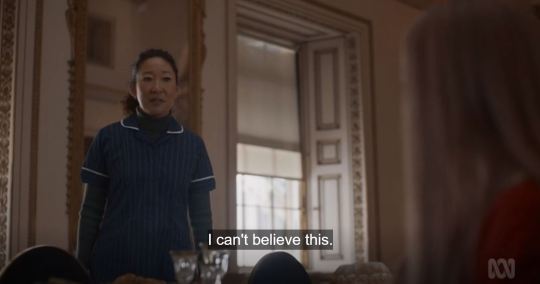
then villanelle’s revealing aaron’s a killer, and aaron’s offering villanelle something eve is afraid she won’t refuse. and he verbalises one of eve’s deepest unspoken fears: that villanelle WILL get bored of her. that she can’t possibly keep villanelle’s interest once they’re no longer caught in a hurricane of external pressures. and then she has to deal with the absolute overload that is the question, push come to shove, would villanelle hurt her?
while villanelle never considers hurting eve here, eve understandably doesn’t realise that. after all, as far as she knows, villanelle killed anna, as well as dozens of other people. villanelle thinks she’s been clear about how strongly she feels, but eve is caught at the crossroads of kenny, hugo, jess, carolyn, konstantin – all these people who promise her that no matter how real it feels, villanelle is a psychopath, could flip the switch in a second. that’s a terrifying possibility: that the woman you’re obsessed with, have given up everything for, might end you and walk away. shrug it off.
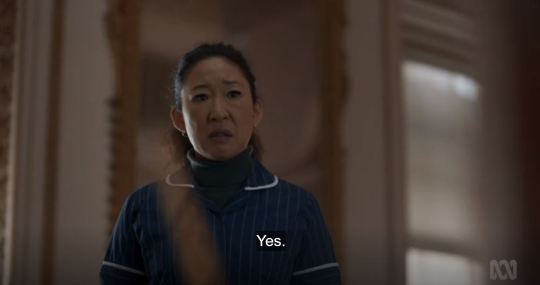
villanelle kills aaron, and eve’s currently up to seeing two bodies in about fifteen minutes. while she hates aaron and isn’t particularly bothered by his death, she’s abruptly sure that they’ve blown the mission entirely, and quite apart from carolyn crushing her under heel, eve’s afraid that their screw-up might result in aaron’s weapon going public, that he might have some contingency plan they weren’t authorised to know about.
eve’s all messed around; villanelle’s surprisingly chill. but eve’s used to villanelle thinking of the immediate, small picture – eve is sure it’s up to her to get them out of all this. she’s concerned for both of them, and believes villanelle truly doesn’t understand the scope of the trouble they’re in. notice that she uses plural language. “we”, “us”. she’s already trying to plan THEIR way out of it. villanelle is a tacit premise, a guaranteed.
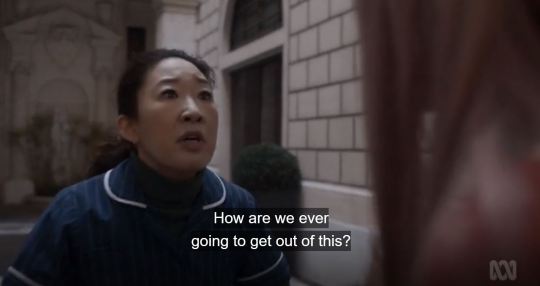
they escape aaron’s place, and then eve becomes set on retrieving the recordings. i think partly she needs a goal to cling to, but apart from, as she says, not wanting people to have died for nothing, she’s also considering that the recordings might be enough to buy back favour with carolyn. that she can barter her and villanelle to freedom if they get carolyn what she wants.
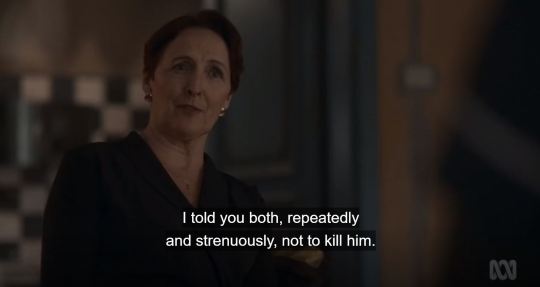
and then carolyn effectively says she’s been manipulating eve this whole time. that eve is so predictable, carolyn could build VERY critical plans around her behaviour. this brings in a whole question of free will – eve begins wondering how much of all this was ACTUALLY her idea, and how much carolyn had subtly suggested to her, nudged her towards. carolyn is something of a mentor, and even if eve never totally trusted her (e.g. she didn’t tell her that she stabbed villanelle), she was at least sure she knew HOW NOT to trust her. she thought she couldn’t tell her about how deep she was in with villanelle, but really, carolyn knew that, and was using it already. it’s a deeper betrayal than expected from an unprecedented direction. eve goes from thinking she’s in control to being totally lost in her own network of relationships. even kenny’s not innocent, and he’s supposed to be their good guy.
so eve stays for villanelle. villanelle, who might be amoral, but has always been upfront about that. she doesn’t hide who she is. she doesn’t judge who eve is. eve takes a breath and decides villanelle is her ally in this. more than her ally.
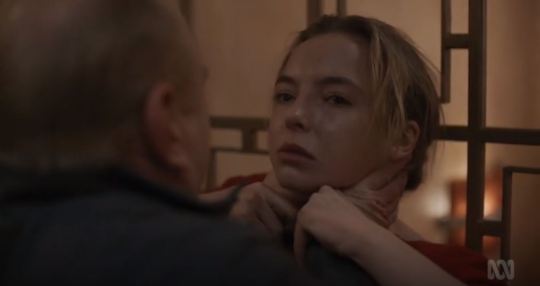
and then eve walks out of the room to find that last person she trusts being killed in front of her. that would make eve’s count 3 Deaths and 1 Major Betrayal in under an hour. so she picks up the axe, and at villanelle’s urging, hits raymond with it.

here’s the thing: eve isn’t ready for this. is she on an increasingly grey trek into darkness? absolutely. would she organically be ready to kill people one day? not sure. i think she has to be kicked into it by a high-stress situation like this, but she was definitely headed towards being completely unbothered by knowing of villanelle’s kills beforehand, helping her set them up, making who-lives-who-dies calls – she basically already was.

this is kind of starting the car at two hundred miles. she doesn’t slip someone arsenic, or snipe them, or even push them in front of a train. she AXE MURDERS someone. yes, it’s in self-defense (or villanelle-defense), but that’s probably THE most brutal way to kill somebody when you’re not deliberately torturing/dismembering them.

villanelle leads eve away from it all, but it’s implanted in her brain now. eve starts going into shock again and exhibiting a range of other trauma symptoms. villanelle’s there to pick up the pieces and take her away.

while they’re walking through the tunnels, the cool air and lack of other sensory input gives eve a minute to process. to get beyond the blood and gore and villanelle-almost-died to “i killed somebody”. yes, a bad person, but a person.
one important difference between stabbing villanelle in 1x08 and killing raymond is that the stabbing was heat of the moment, chased by instant regret. but eve had second after second before hitting raymond with the axe the first time, and then even longer before killing him. there was time to think. time to stop herself. i also don’t believe that raymond, while followed immediately by disgust, is actually something eve regrets on a gut-level. she’s prepared to do anything to keep villanelle alive.

again, eve feels a little more control when presented with a goal: get through the slats. symbolically, it’s a staircase up from darkness to light. it feels like she’s literally getting herself and villanelle to somewhere things will be better. like getting to the end of this fucking terrible day.
when they get to the ruins, eve is kind of stunned, staring around, because it seems like such a weird contrast: she feels horrible and dirty, but she’s surrounded by beauty. and then she’s beginning to realise that maybe she doesn’t feel that horrible, that dirty, and what does that mean for her? for who she is?

when villanelle asks what eve wants for dinner, she says spaghetti. yes, probably part knee-jerk response because they’re in italy and these are two images eve associates, but mostly because it’s comfort food. eve is seeking out something slow and soft and familiar after the last few hormone-and-tragedy fuelled hours. and then villanelle’s telling her about alaska and saying they could be normal, and right now, normal sounds pretty good.

she sees villanelle as offering salvation. they can keep this feeling of beauty. villanelle won’t judge her for killing raymond. she says yes to alaska because she wants all that; she knows she wants villanelle and she knows she wants to leave rome behind.

and then villanelle pulls out her gun, and everything goes to shit. eve just found out carolyn’s been manipulating her for her own purposes, so of course she immediately connects villanelle to that experience, and has the heart-crushing “realisation” that villanelle’s been doing the exact same thing.

as i said in villanelle’s 2x08 post, villanelle DID want eve to kill raymond, but because she thought it would be good for eve: liberating, exciting, relaxing. but in the wake of carolyn’s puppeteering, it’s very natural for eve to read this as villanelle attempting to sculpt eve, to pull her strings as well.
like i mentioned earlier, eve wasn’t ready to kill raymond, which villanelle didn’t recognise (“you had it under control” / “no…”). she’s dealing with all kinds of internal turmoil now, and suddenly it turns out that this is unnecessary. that villanelle, who thinks nothing of murder, could’ve done it for her and spared eve all this.
this comes back to eve’s sense of self. through season one, eve considered herself a Good Person. after stabbing villanelle, she went on kind of an identity bender (telling niko she’s not a nice person), and that was great for her, because actually, fundamentally, she’s not a Good Person. but eve’s not prepared to be a Murderer. we’ve talked before about how eve has a lot of classically narcissistic traits. what’s the most upsetting thing for her here isn’t killing raymond, it’s that she’s lost control of her own narrative. she could rationalise her slipping when it happened slowly, but now, eve is dealing with the full-velocity crumbling of DECADES of programming that has given her rules of who and how to be.
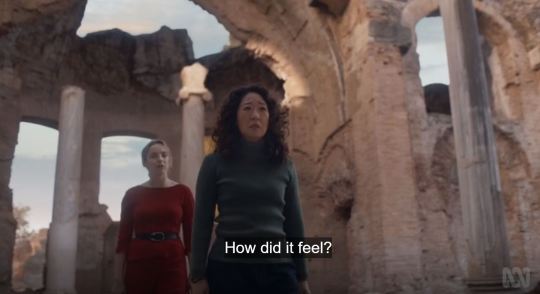
“how did it feel?”
“wet”. wet, and: not as bad as i thought; i don’t feel as much as i thought; or i do, but it’s the wrong things. asking eve to address how she ACTUALLY feels rather than how she thinks she SHOULD feel is just inadvertently rubbing salt in the amount of cognitive dissonance she’s experiencing between self-image and reality.
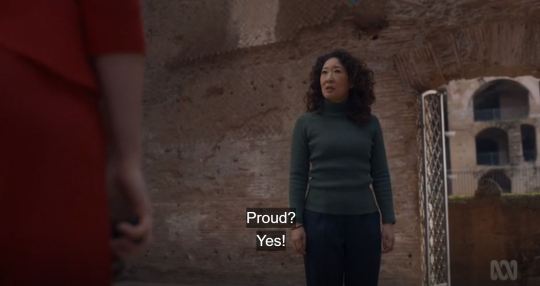
“i’m proud of you.”
and this gives eve room to breathe, because it allows the idea that maybe it’s villanelle’s fault. villanelle, who eve has already perceived as manipulating/betraying her by lying about the gun, can be the reason that this happened, and then nothing has to change. eve loved villanelle at X number of murders, what’s X+1? doesn’t make a difference. and eve gets to stay as the more-innocent one.

so she presses that blame outwards. she decides that it can be villanelle’s responsibility – she easily defended villanelle’s killing aaron to carolyn, so no issues here with this. and then she says she wants to go home, and just like with the spaghetti, this is a bid for familiarity. to return to an old self-image that has been irreparably rattled by killing raymond and how she feels and doesn’t feel about killing raymond, which she hasn’t even had time to digest yet.
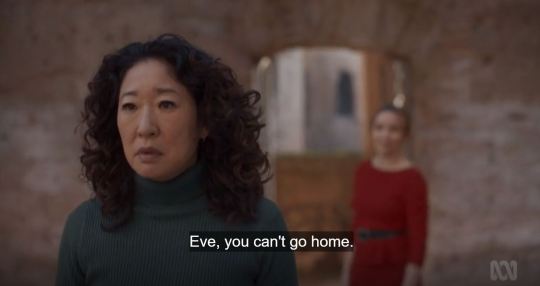
this is such an unintentionally vicious thing for villanelle to say, because on some level, eve KNOWS this (and understands it far more deeply than villanelle has even meant it). niko is gone. she turned carolyn away. kenny is in on it. hugo is probably dead. and now she’s killed someone. there IS no home – not the way it was. but eve has just lost this former home and now the promise of a new home in alaska, since that’s been directly and immediately juxtaposed with villanelle concealing the truth about the gun, which throws everything else about alaska into question too. is it a pipedream? did villanelle even mean any of it?
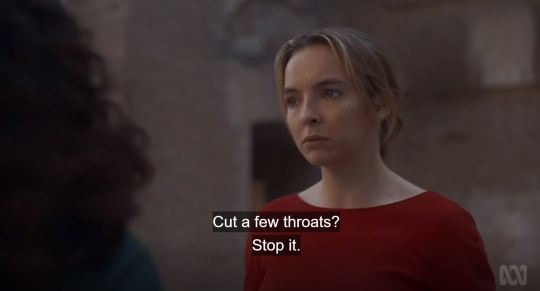
so she lashes out, reacts as ardently as she can against something villanelle didn’t even consider offering (“like bonnie and clyde? just go on a killing spree?”). she’s scrabbling back to that previous version of the self by staunchly standing against anything new, and exaggerating it to talk herself into alaska being less appealing, so she can let go of it.
also remember: this entire time, eve is still in shock. she’s had a whole quarter of an hour to come to terms with this.

here, eve says “you want me to be a mess. you want me to be scared”. it’s a way of justifying her actions – eve would only kill if she’d been messed up and terrified, right? right? she’s projecting her fears about villanelle and herself onto villanelle, and then she has a physical sounding board to react against. eve can demonstrate to herself by demonstrating against villanelle.

no, eve hasn’t had time to cool off yet, but she’s adapting with the smoothness of we’d expect, given all the little flags about her sitting on the psychopathy spectrum. she’s able to push back against villanelle, step forward, reclaim control.

the scene might’ve ended very differently if villanelle hadn’t emphasised that EVE wanted this. they’ve both confused each other and themselves, and neither of them is fully wrong or right. eve did want at least some of this, but less immediately, and she was barely consciously aware of it. at the same time, villanelle definitely wanted it too, and her being more vocal about it makes it seem more like HER idea to eve. she’s losing that control she desperately needs.
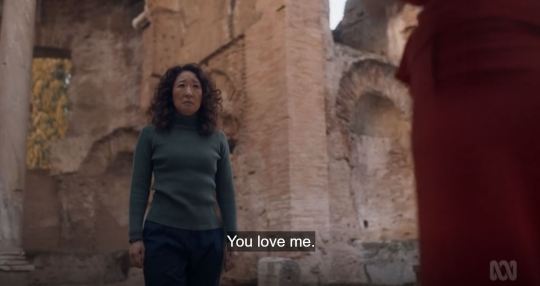
“you love me” is a truth that might’ve been easier for eve to deal with if it wasn’t in conjunction with other truths, like the fact that she’s capable of murder. in denying her love for villanelle, she’s trying to cast off her love for everything else villanelle represents – all the violence, the excitement, the extremes.
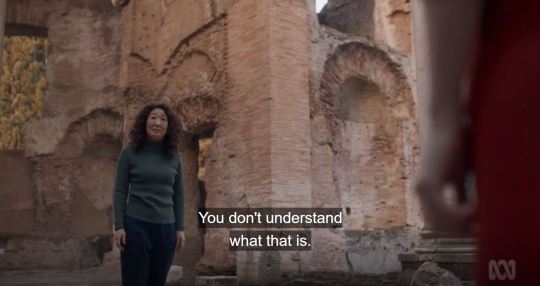
because if villanelle doesn’t love her, eve can walk away with some of herself intact. especially seeing as she now thinks villanelle’s been manipulating her, pushing her, and she’s wondering how that escalates, how can she trust someone who’ll shape her behind the scenes? niko was always cramming her into a tiny box she didn’t fit into, but now villanelle’s stretching her out of it, into the open space too much too fast.

there’s this beat here where you can see the devastation on eve’s face writ large. she feels abandoned and alone and she’s SO MAD that she put her faith in villanelle against the odds and in her mind, it was broken. this is a really charged sequence, so eve hasn’t really had a break to consider how villanelle might be thinking, which she usually does – one of the reasons they work is that eve understands how villanelle’s brain ticks. but she’s so caught up in her own trauma right now that she’s not being as patient with villanelle as usual, which is obviously understandable. but when villanelle calls out “eve!” all desperate and strangled like that, you can watch the emotional toll. she stops backing away. she pauses. this is the last possible moment where we could take the exit on the highway, and salvage these miscommunications.

but then, as i said in villanelle’s post, villanelle blocks it out, blocks eve out.


eve cries. in the space of a few hours, she’s lost EVERYTHING. and now that fear aaron tapped into at the beginning of the episode is “realised” – she’s not enough for villanelle; she’s not special. villanelle has singled her out since 1x01, has said “like us”, has said “i’ll look after you”, and it’s all over.
so the pause ends. she goes back to retreating, she turns away so she won’t have to look at villanelle and see everything that nearly was; see alaska. because yes, eve agreed to alaska while under a phenomenal amount of pressure (from circumstance, not villanelle; villanelle wasn’t pressing for an absolute answer), but i think it held a very real allure to her, too. time to breathe out. to spend that time with villanelle. to have all her questions answered. to see who she is entirely away from the trappings of ordinary life.
for eve, villanelle manipulated her into killing raymond, then offered her alaska, then rescinded and decided eve wasn’t special, so perhaps the offer of alaska was never real, or villanelle was only going to offer it to eve after she’d murdered someone. villanelle only wants a particular eve, one that eve isn’t even sure is really her.
is that true? no. villanelle was getting ready to pitch alaska before they even went back to the hotel. if she REALLY wanted eve to kill someone, she would’ve set her against aaron when she arrived with the letter opener, and she wouldn’t have told her to run from trouble, she’d have told eve to stand her ground.

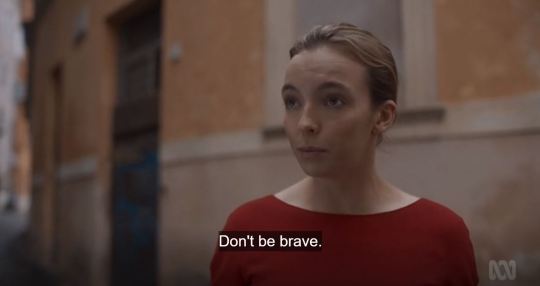
and killing raymond, in a lot ways, is who eve is, or who she’ll become.
but eve can’t read villanelle’s thoughts. she’s been through an incredible amount in one day. she doesn’t know what’s real. who to trust. whether promises are made with crossed fingers. if anyone cares about her, or just cares about what she can do for them, what she can become for them.
how will she feel about the murder once she’s had a bit more processing time? what will she think about villanelle confessing her love, then shooting her? what will their next meeting be like?
i’ll get into that in my write-up about narrative choices for the show.
i’ve also posted another one of these about villanelle, and how villanelle’s thinking and feeling (check #villanevest writes).
inbox me, comment or message with your thoughts. take some time to mull over the finale. remember, it’s a slowburn, guys. personally, i’m really excited by all the possibilities, but like i said – that’s for another post.
#ke spoilers#killing eve spoilers#killing eve#ke#ke essays#villanevest#villanevest writes#villaneve#villanelle#eve polastri#villanelle x eve#eve x villanelle#killing eve finale#killing eve 2x08#villainever writes#ke finale#ke 2x08
463 notes
·
View notes
Note
🌈💘🌸👌🛏️ (for Hanzo and Fujin/Shinjiro, all of our ships-related verses for science 👀)
Sexy Headcanon Meme! || @sonxflight || accepting

🌈 - Sexual fantasies?
Except modern, Hanzo’s fantasies are rather tame; his experiences are mostly limited to in the bedroom with vanilla, missionary penetrative sex (with Harumi), or in some historical verses (like half-demon and samurai), he has no experience, so mostly, he would be keen to swap positions, locations, or even shaking up the bedroom antics. If the relationship had been long-term and emotionally well-bonded, he may be open to even getting it on outside, risking to be seen, or if they were in a relationship, he would be more than willing to be open to experiment with different sexual positions. With modern, anything is out in the open; he will even try BDSM and being submissive, if there is enough trust, of course.
💘 - Kinks?
Sensory deprivation (all); taking one of his senses away that he has to rely on other senses to enjoy his sexual experience. Blindfolding him heightens his other senses because those senses are compensating for not being able to see. Touch becomes heightened, sounds become magnified, etc. The experience becomes much more enhanced and magnified.
Bondate (modern); This can go one of many ways, but as long as both him and his partner are comfortable and have safe words, it can actually be quite enjoyable. Hanzo is so used to control everything, or has severe fear of losing control - in his dismantled tragedy - so he can feel liberated giving his partner the control. Bondage can be a range of things from simple bandanas to handcuffs and all types of other contraptions, but Hanzo’s preference would be handcuffs, which are easily accessible due to his profession.
Sex in ‘inappropriate’ places (historical verses); Taking sex out of the bedroom and doing it in unusual places would be something Hanzo at least once fantasized about. Now, "unusual" or "inappropriate" is a moving target, depending on how wild his regular sex is - Hanzo’s is mostly tame in many verses. The ‘forbidden’ fantasy for him just may be moving from the bedroom to the living room, and then living room out to the nature. He does imagine him and his partner having penetrative sex in nature - against the tree or on the sand in private beach - still somewhere very private and secluded.
🌸 - Do they have an aftercare routine?
Hanzo (in pretty much all verses) puts a significant importance to take the time to care for one another, wind down, catch his breath, continue to play/feel/touch, be sensual with each other and take good care of himself and his partner. He loves all the aspects of aftercare, which are not limited to; cuddling, holding, pillow-talk, sensual touch, taking care of his partner’s physical and/or emotional wellbeing, discussing things that went well and giving positive reenforcement and even laughing.
For Hanzo, sex is sacred, intimate and it’s probably the one of the most things that makes him feel vulnerable. Aftercare is a way of showing kindness and caring to his partner and he expects his partner to do the same. He will most likely continue to hold and cuddle his partner (he prefers to top, so he likes to have his partner lay on his chest as he entangles his arm around him/her), and most likely spill poetic nothings to his partner. Also, it will most likely lead into non-penetrative sensual touches and kisses in-between.
👌 - Favorite position?
Good old missionary and legs-up missionary (all), lotus (modern), doggy style (modern), spooning (historical, including half-demon), mutual masturbation (non-penetrative, all).
🛏️ - Do they like having sex outside of the bedroom? If yes, where?
See the above for sex in ‘inappropriate’ places.

🌈 - Sexual fantasies?
While Fujin’s sex drive is off the charts in a dedicated relationship. He doesn’t run wild with his own sexual imagination, but enthusiastically matches his partner's style and needs. While both of them are not virgins, they still lack the scope and depth of their experiences to come up with them. Sexually, Fujin/Shinjiro looks forward to intimacy as an opportunity to express love and caring. He is generally very interested in the happiness and satisfaction of his partner. Because he achieves much of his personal satisfaction from making others happy, he is a skilled lover nonetheless, considering the lack of experiences. He is likely to follow a schedule for intimacy, and may be prone to becoming routinized. For him, the most important aspect of a sexual encounter is the affirmation of love and affection.
Power, control, and rough sex (Fujin); anything falling under the umbrella of bondage, discipline, dominance, submission, sadism, and masochism (BDSM). He likes to top and dominate.
Passion, romance, and intimacy (Shinjiro); These fantasies involved meeting emotional needs through sex, such as connecting with a partner, or feeling loved, appreciated, and desired.
💘 - Kinks?
Extreme arousal from being touched (both); It doesn’t have to be his erogenous zones. Fujin/Shinjiro loves being touched pretty much anywhere.
Auto-erotic asphyxiation (Fujin); Breath control, a mild strangulation or suffocation.
Being Dominated (Shinjiro); Fantasizing about being dominated doesn’t imply that he is weak or that his partner is superior to you, though. Fantasies involving power play may speak to a desire to gain or relinquish control regarding his private life, work life, or role in society, for power dynamics in an erotic context create such sensorial arousal.
Dressing for pleasure (Shinjiro); Wearing specific kinds of clothing or specific fabrics to enhance sexual stimulation (especially silks).
🌸 - Do they have an aftercare routine?
Fujin’s most powerful source of happiness is making his partner happy, and aftercare after sex provides him with a great opportunity to prove how well he can please his partner. His strength lies in the physical intimacy as the love language he speaks is through shines. He will help his partner wash up, bring a glass of water to hydrate, cuddle and initiate sensual touches afterwards. Because of his significant experience spending time with humans, Fujin is well-knowledgeable enough to know that his partner deserves care after such an intense experience. Partners may feel vulnerable, highly emotional or potentially experience forms of trauma.
Shinjiro as a psychiatrist speaks the language as he will be there in every step of the way, offering physical and emotional connection. He would make sure his partner is okay and healthy before and after sex can perhaps make future sex with them more romantic and pleasurable.Taking care of his partner will make him feel much happier after. Checking in on himself and his partner after sex is also the polite thing to do. Sex itself is intimacy and a sacred endeavor, so taking the time to look at his partner as an equal human with feelings is strongly significant.
👌 - Favorite position?
Close-contact missionary, the cross (modified missionary), spooning, face-to-face (all).
🛏️ - Do they like having sex outside of the bedroom? If yes, where?
For Fujin, in the Sky Temple, and in the nature. For Shinjiro, in his office.
#✗ obsessive cathartic (headcanon)#✗ the ineffable testimony of spawned hellfire (scorpion)#✗ unwavering wind of celestial might (fujin)#✗ seeking reconciliation with his own humanity (iii)#✗ ugly syllables of conjured vindictive crimson (modern au)#✗ everlasting embers gone wild (half-demon verse)#✗ be calm before the storm (mk11)#✗ bitter inertia of mind's flow (modern au)#(nsfw)#sonxflight
2 notes
·
View notes
Note
This is random but based on your last meta about NTT 55 and the abuse. I wonder if that punch Bruce gives Dick is the beginning of the Batman writers upping his violence onto the kids (Dick, Jason, Tim) and just never addressing it. So like beside sparing and moments of being drug/hallucinating has Bruce shown so much physical violence and anger to them before that issue/moment. Is that the beginning of Batman writers thinking an angry/aggressive/violent Bruce/Batman is popular and creates fans.
Technically speaking, I know it wasn’t the first time but to my knowledge all the prior instances were treated as like….y’know, either a product of being written fifty years ago and nobody thinking twice about Bruce smacking his ‘ward’ or else due to various mind control scenarios, etc.
To be honest, my knowledge of early Batman and Robin stuff is more sporadic….I got into comics when I was ten, around ‘94, and Dick was one of my instant favorites who I latched onto immediately and had to know everything about….but my introduction to him was as Nightwing, and in his new solo series and the Titans books so everything else I kinda caught up on just to have more stories with him. And since it was him as Nightwing that I was drawn to specifically, there’s a lot of early stuff when he was still Robin that I never really dove into in depth.
I mean, new content that was being produced at the time and just was a flashback look at him as Robin, I ate all of that up (lol nostalgia does have a lot to do with my fondness for R:YO and Annual that did my preferred retelling of his origin). But yeah, its not accurate to say he didn’t interest me as Robin, per se, more just that like….there’s only so far back I could go before the earlier written stories just weren’t quite what I was looking for.
So for specifics on any earlier instances, I would look to @northoftheroad or @internal-ethics for that, as their knowledge of Dick and Bruce’s pre-Crisis days far exceeds my own.
But no, to the best of my knowledge, there was nothing before that which came even close to being like it in tone or scope.
I think its more this was symptomatic of the writers shifting to a more grim and gritty Batman, rather than that developing in the aftermath of scenes like this one. Like I mean, I don’t think that scene created a turning point in how writers depicted Bruce’s dynamics, so much as it was the result of writers in the aftermath of that turning point having already been reached.
It was the zeitgeist, you know? Personally, I blame Frank Miller for a lot, as he spawned a ton of imitators who saw what a hit he produced with his take on Bruce and I think a lot of writers just hoped that a similar take would net them a similar reception. But to be fair, its not like it was just him, since the only reason he even was a huge hit in the first place is that his Batman resonated with what a lot of people were looking for at the time.
Like, Tim still living at home and then with his dad still being alive for a decade after he first appeared…it wasn’t an accidental divergence from the first two Robins being orphans that Bruce took in and made family….it was part of the point of Tim. There is a tendency IMO (and I’m guilty of it too) to get so focused on the in-universe dynamics and character choices that we forget at times that none of these characters do anything other than what the writers write with intent, and Tim’s origin was a product of that.
He wasn’t written as initially having more of a strict partnership or mentor/protégé relationship with Bruce as opposed to the familial structured ones Dick and Jason had, like…..I just mean….that wasn’t the result of Bruce keeping him at arm’s length at first because of his grief after Jason’s death. Its more the other way around. That character choice, for Bruce to keep him at arm’s length, and Tim having an origin that allowed for Bruce to do that as Tim didn’t live with him or need to be around him as often as Dick and Jason had….all of that was the product of DC and the writers wanting a less familial relationship between them, initially. Because it was all part and parcel of the whole “I don’t do family, I have allies and that’s it, I am grim and brooding and alone and I like it that way except also I don’t like anything, how’s that for a riddle, Nygma.” *waves hand at the previous* Y’know. That bullshit.
Like….a huge part of why Jason was so insular to the Batman franchise and had so few friends among the superhero community and made so few appearances in other titles like Titans….you can explain that any number of ways in-universe, but ultimately that goes back to the fact that DC didn’t want to ‘lose’ another Robin to another book the way Dick eventually migrated over to being more associated with the Titans in the 80s than with Batman. Again, its not like that wasn’t an editorial choice too….they’re the reason Dick was kept away from the Bat titles, its more like….
Here, let me lay it out like this. Basically, as far as I’ve ever understood and interpreted it, it goes like this:
Dick and his group of Titans become successful in their own right, making the Titans a new separate and successful franchise in and of itself, independent of their mentors….and being the face of the Titans, DC wants Dick more strongly associated with the Titans so they create in-story reasons for Dick to stop being Robin and to come up with a new identity that’s more associated with Dick Grayson: leader of the Titans than with Dick Grayson: ward and partner of the Batman.
And initially, there was no real conflict between Bruce and Dick about this, they were on good terms, Dick gave Robin to Jason himself….because Dick’s departure wasn’t the inevitable result of character conflicts or some narrative reason that he had to be limited just to the Titans instead of still being a steady presence in Batman’s book….rather, it was all just made to allow for DC to keep two of their franchises separate and distinct from each other, because they didn’t want to cross-pollinate and make the success of each franchise linked to or even dependent on the other one.
And Jason was just as much a product of these decisions. Jason didn’t have a lot of ties to other books because Bruce kept him so decisively by his side, nor did he and Dick not appear together a lot because they disliked each other or didn’t have a relationship….rather, all of that IMO was an end result of the DC editorial decision to have a Robin who was almost exclusively linked to Batman in readers’ minds, with no clear, visible ties to other books or franchises that would result in him being anything other than one half of the Dynamic Duo.
(And personally, I’ve always thought this is where they really screwed up with Jason and his stories. DC claimed to want to kill Jason off because readers didn’t like him, which isn’t quite as factual a claim as has been indicated at times….but regardless….DC failed to factor in that perhaps why Jason wasn’t as popular as Dick or found as compelling by readers at the time was that DC didn’t prioritize…..giving Jason his own distinct identity and presence aside from just being Bruce’s sidekick.
Its like, DC wanted to make another Robin because Dick was so well-received, but Dick’s popularity meant eventually there was reader demand for him beyond what Batman’s book could allow for while still be focused on Batman, ergo Dick was moved elsewhere and Batman got a new Robin……who DC accidentally sabotaged from day one by deciding they wanted a Robin whose purpose was to be part of Batman’s narrative….failing to recognize that a character without a clear narrative of his own….is never going to be as interesting or compelling as others who are allowed to exist independently of their mentor).
And THEN came the zeitgeist shift. The gradual, tonal shift of reader priorities and interests (or at least, as DC interpreted them), with DC shifting their own priorities around in order to better capitalize on what they felt would be most profitable in the newer social climate. As far as they seemed to think, what readers really wanted were brooding, violent anti-heroes who were solitary and needed no one….which doesn’t really fit either Bruce Wayne: Family Man, or Bruce Wayne: Has Strong Ties to Others Outside his Franchise which Makes Them Strong Allies.
Hence, the retcon of Dick being fired from Robin instead of moving onto another identity by his own choice…..so that Dick’s reasons for not being present in the Bat franchise would be more due to emotional estrangement, thus validating the image that Bruce was (mostly) on his own, and that was the way he preferred or thought he needed it.
And then when Crisis allowed for a ton of possibilities in changing character backstories and even natures, DC made huge changes to Jason’s character….making him the grim, gritty ‘darker’ sidekick that was a better tonal fit for the darker Dark Knight they wanted to promote, and simultaneously doubling down on Dick’s own estrangement by compounding Bruce’s errors with him, as he gave Robin to Jason without asking and gave Dick all the more reason to feel he didn’t have a place there and to stay away.
And herein lies the danger of allowing your audience (or your perception of your audience and their wants) dictate your story-telling, rather than just letting your writers tell their damn stories without you constantly trying to make it a paint by numbers scenario and get more bang for your buck.
Because only a year or so after making huge changes to Jason’s character and basically re-envisioning him from the ground up, DC still felt that Robin wasn’t as well liked or as popular with readers as they wanted him to be….shockingly, I mean considering that if you think your readers only want dark heroes oozing over with violence and barely suppressed wrath, I don’t know how you convinced yourselves Robin was ever going to fit into that paradigm without re-envisioning Robin, rather than Jason himself.
Like, you can make the sidekick of your would-be dark, gloomy antihero as angry and violent as you want….but if at the end of the day, he’s still decked out in a costume that’s meant to be cheerful and fun, with no change from the iconic look that for decades now has been associated with a playful, mischievous counter-balance to the Dark Knight’s dourness….
Basically, no one’s going to go home happy is all I’m saying. DC was never going to get the success they wanted from that, because they shot themselves in the foot from the get go by wanting it both ways. The name and image recognition and built-in audience that comes from a reputation and public awareness that took literally decades to establish…..at the exact same time they wanted that very same character to be popular with the =readers they thought didn’t want the kind of content largely associated with Robin..
(IMO they could have actually gotten closer to what they wanted and killed two birds with one stone by like….building up Jason with his own distinct identity and narratives….which in turn could have led into Jason deciding Robin wasn’t the right fit for his own mission and reasons for being at Batman’s side, and thus building his own persona and mantle distinct to him just like Robin was distinct to Dick….but for the time being, still being Batman’s sidekick. If DC weren’t so insistent on it being Batman and Robin or nothing….they could have had Batman and someone else…whose new name and mantle could have been more along the lines of whatever they felt better conveyed the grittiness they wanted to sell via the Bat franchise.)
But anyway, so then Jason is killed off, with the in-story reasons really just being the cause and effect mapping of DC’s actual editorial direction to make Bruce fit the idea they’d built up in their own heads of what people really wanted Batman to be….
And yet bizarrely, they still didn’t wind up happy with the results. Apparently, Robin itself wasn’t the issue, just as Jason himself had never really been the issue. And once again, barely a year or two later….
They created Tim, but they still weren’t giving up on their obsession with this lonely, brooding Bruce who needed no one and coincidentally had no one…so they made sure to keep clear boundaries in place, initially. This is Bruce’s student, not his son, they were insistent. Just so everyone’s clear. See? He has his own dad. He even hires an actor to play his uncle when his dad is in a coma, just to keep CPS off his back because he knows Bruce would just take him in himself if that happened, and that’s not what Tim wants see, because Tim has his own dad, he doesn’t want Bruce to be his dad, ergo there is no danger of Bruce being paternal and affectionate and having *gulp* feelings. Of the positive variety.
And incidentally, well, not incidentally at all, since my whole point is all of this is always the result of clear, deliberate writing choices made to match editorial directives……regardless of the in-story explanations of Tim being so much more independent and operating solo so much more than his predecessors, like….because Bruce spent so much time brooding and being unapproachable and Tim needed more stimuli, what’s a bored superhero in-training to do, y’know….
Well, aside from all that, there’s also the factor that Tim was so much more independent than his predecessors had been while Robin because a) DC at least had learned from their mistake in not allowing Jason to have much of an identity of his own, b) the rapid expansion of both Marvel and DC in the early nineties, following what they called a speculators’ boom (basically both companies convinced themselves comics were about to be worth their weight in gold because a bunch of speculators had taken to buying up issues they thought would be worth a ton in the future, all pretty much due to the fact that some guy managed to sell a rare, first edition of X-Men #1 for a shit ton of money. Comic book companies are stupid. Have I expressed that enough in this one single post? LOL).
Anyway, so b) due to the rapid expansion of both the Big Two, DC was pumping out a ton more books than they had previously, which meant they had room for both a Nightwing solo book and a Robin solo book, so a huge part of the perception of Tim’s independence stems completely from the fact that he had a book to showcase these independent adventures in, without Batman or another team like the Titans being present (and still the priority).
(Which again, like. I’m always insisting that just because we didn’t see much of Dick and Jason bonding or hanging out on page before Jason died, didn’t mean it didn’t happen - just that there was no place to put scenes like this that didn’t involve either Batman or the other Titans, given that those were the only two titles they appeared in. Similarly, there’s no reason to assume Dick and Jason didn’t both go off on their own at times between issues and have adventures on their own or investigate stuff at their schools or any of the stuff Tim did in his solo title…..its literally just that before there was a solo Robin title to show Robin having solo adventures……the only place for these things to happen was…..off the page).
Bottom line, everything about Tim was constructed from the get go to be as unthreatening to the idea of a dark, repressed, brooding Batman as it was possible to get while still being Robin.
And yet…..even that didn’t last, weirdly. As over time, editors and writers desperately seeking the secret ingredient that would make this franchise really gel with readers the way they so desperately wanted it too…..over time, various someones stumbled into getting away with scenes where Alfred, Bruce, Dick and Tim still managed to be warm and familial with each other regardless of all that…
And shockingly, someone at some point figured out: Eureka! Readers love this!
So they doubled down, as they usually do, the second there’s profit in the air because yay capitalism…..
And thus its again, regardless of in-story justifications….
Not remotely a coincidence that Dick’s adoption, Cassandra’s creation and clear trajectory to being included in the Batfamily either officially or unofficially, Bruce’s initial offer of adoption to Tim even though Tim wouldn’t actually accept until years later, our time…..
Like, there’s a reason that all of these things happened in basically a five year period, real time…..even though prior to this, new additions to the Batfam, let alone official inductions, were more like a once every ten years kinda thing.
For a brief window, DC figured out the magic formula for writing a family is writing them as a family, and hark, ‘twas a blessed sight indeed.
And then someone was like, hey, y’know what’s missing? What if we bring Jason back?!
…….and then DC managed to pretty much wreck every progress they’d made towards having a brain, as they fucked that up in the most spectacular fashion possible by completely missing the point of why or in what ways readers most likely would want the missing and dead member of this family to show up alive and well.
*headdesk*
And over the years since then, the kids’ various official statuses have shifted left or right without rhyme or reason, following the whims of every new writer or editor to think: Eureka! I’ve done it! I’ve cracked the code! With frequent reversions to Bruce the Brooding Billionaire Bastard, loads of Not Good Parenting and downright abusive behavior, and a shit load of confusing contradictions.
Meanwhile, me, sitting here:
“Hey DC, maybe the problem is that you just can’t shove something like “adopted a gaggle of gremlins” into the bottle after uncorking that and letting readers see that its out there and a possibility…..so what if you just fucking committed to the one and only thing that’s managed to net you a positive reception every time you do this same dumb song and dance routine: actual family acting like actual family, actually.”
Anyway, how’s that for yet another
“How did Kalen’s Post Get From Point A to Side Tangent Z, Section 4f, Sub-Paragraph D13?”
16 notes
·
View notes
Text
A guide to the 02 kids’ personalities and overall demeanors
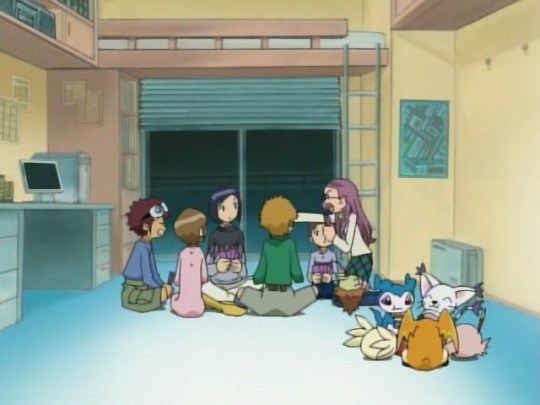
I’ve already covered the deeper details of each 02 kid’s character arc and development throughout the series, but I figured I might dedicate a more specific post about the complexities of their outer personalities, and their behavior patterns on a day-to-day basis. 02 is the kind of series that doesn’t really spell out what the characters tend to do or don’t tend to do, or what boundaries they will and won’t cross, which means it can be a bit of a challenging task to track their behavior over fifty episodes and figure out the patterns. Fortunately, these characters are written remarkably consistently over said episodes, so we have a lot to work with!
Disclaimer before we continue: In general, all of my 02-based meta is specifically written for the Japanese version in mind, but this especially applies to this one, because the majority of the nuances of the demeanor and personality traits described below were not retained in the American English dub at all (please see this post for more detail). As a result, please understand that if you’re working from the perspective of having only seen that dub, and the contents of the below post sound completely different, that would be why.
Daisuke and V-mon
Believe it or not, I would say that Daisuke is actually the most difficult to nail the nuances of out of this entire cast. This is probably a really weird thing to hear when the usual fandom mantra is that he’s “flat” or “lacking in development”, but I think the deceptive part is that while he’s simple-minded and himself doesn’t think in complex terms, analyzing his behavior as a whole and how he approaches things actually involves a lot of very delicate balances, and getting that exactly right can be very easy to mess up. Daisuke’s not a rude jerk who looks down on anyone, not in the slightest -- but he’s also not a saint who can do no wrong, either!
I think the easiest analogy (which I’ve brought up several times on this blog already) is that Daisuke is like a puppy, but not just any puppy -- a tiny puppy that barks very loudly at anything it perceives as threatening (regardless of whether it’s actually threatening), makes its feelings very clear with obvious likes and dislikes, and can do some phenomenally stupid things in a bid to please others, but in the end means no malice and only wants you to be happy.
This is to the point where I’m just going to have to bullet-point this, because there’s so much going on at once:
Excessively emotional: One of Daisuke’s earliest profiles refers to him as having “an excessively large range of human emotions”, and really, a lot of the humor surrounding him has to do with the fact he has incredibly dramatic, overblown reactions to nearly everything around him. So if he gets a little annoyed or suspicious of people making fun of him, he tends to get really dramatic about being upset, and when he experiences only a minor setback, he acts like it’s the end of the world, and when he’s emotionally hurt, he sometimes even gets set on the verge of crying (you can especially hear this in Kiuchi Reiko’s delivery). Even Daisuke himself doesn’t tend to get caught up in it for too long and gets over things surprisingly quickly, so you can take it as him just constantly being too wrapped up in the mood -- but when it really is a serious situation, he gets truly emotionally invested in it, too.
Too easy to read: Because Daisuke wears his heart on his sleeve and is dramatic about everything, he’s awful at hiding anything. Any attempt at trickery or trying to disguise his intentions quickly blows up in his face because he’s too simple-minded and too transparent.
Not malicious: Daisuke only ever lashes out or gets angry at others when he thinks others are doing something he disapproves of, or when he thinks he’s being attacked; he’s very warm and kind to everyone otherwise (even in the earliest parts of the series, when he’s at his roughest, you might notice he’s very soft around Chibimon, as if understanding that his partner is now in a very small and delicate form and needs to be treated accordingly). In other words, Daisuke is very quick to get defensive, but he has no malice or reason to be condescending towards anyone otherwise, and he’s perfectly friendly with people even when they’d provoked him earlier (because he doesn’t really hold grudges). He doesn’t attack people without reason; even when he voices dissent against what someone is doing, he very rarely, if ever, insults a person or their character directly. Even when he’s trying to state his opinions (such as when he bids for the others to accept Ken), he never forces them down others’ throats and accepts that they disagree with him, even if he’s clearly not happy with their disagreement.
Easily critical and suspicious: Daisuke is a very bluntly straightforward and honest person, and he seems to get most set off by people who act suspicious; note how his early-series outbursts towards Takeru tend to be when Takeru’s acting evasive, and in Hurricane Touchdown, he catches onto Wallace’s shady behavior even before he starts flirting with Miyako (Daisuke’s own method of trying to seem attractive to others involves just “doing something cool and hoping it’ll impress others”, so he seems to dislike the concept of flirting as a whole). Because of that, he catches easily onto “things looking off”, so he tends to call it out (even if sometimes he’s overdoing it and there isn’t actually anything significant to be upset about).
Supportive and adoring of others: Other than the moments when he gets set off, fundamentally speaking, Daisuke likes other people, is perfectly willing to acknowledge them or heap praise on them when they do something awesome, and generally cares for their well-being. He’s easily defers to others when he understands they’re better than him at something, and he even has a decently realistic scope of his limits (see how he’s perfectly aware he’s likely to lose the soccer game in 02 episode 8, and figures he might as well enjoy the experience). This is even taken to its logical conclusion in the Kizuna drama CD when he “credits” his friends for giving him amazing and insightful advice when all of it was actually pretty ordinary stuff they’d done offhandedly. It also means that, given his penchant for getting emotionally invested in everything, he has a huge emotional stake in making sure his friends are doing okay, and supports them accordingly.
Deferential to seniors/elders: Tying into the above, you may notice that Daisuke takes a properly respectful and soft tone towards his elders and seniors in nearly all occasions, even to the point of occasionally using proper polite-form language around them. All things considered, Daisuke is a pretty well-behaved kid.
Constantly getting strung around: As much as Daisuke looks like he’s aggressive, in actuality, it’s very easy to get him to back down if you argue against him strongly enough, and since he has such a “the heck is that?!” attitude all of the time, you can see him constantly getting strung around and at the mercy of things happening around him. That doesn’t mean he doesn’t have enough will to put his foot down when it becomes a really important subject (especially in the second half of the series), but it’s very often when he’ll be talked down by others around him and shrink with an “oh...okay...” In fact, this is why a lot of his actions aren’t nearly as reckless as they might be otherwise; as much as he’s a bit hot-headed and likes to lead the attack, he also has a sense of self-preservation and intimidation when things look a bit too dangerous, and will only push forward in such a case when there’s something he really believes in at the other side of it.
Lacking in self-awareness and insecure as a result: While Daisuke doesn’t have any signs of persistent self-hatred (on the contrary, there are times he arguably comes off as overconfident), it also seems that he has practically zero awareness of how he himself is doing -- which means that he ends up rolling over like an idiot trying to get others’ approval and trying to impress them, even when it’d be clear to anyone else that he already has that approval. This also likely ties into the fact that he’s perfectly capable of acknowledging others’ accomplishments and skills (see above), so you might even think that the problem isn’t so much that he thinks he’s bad as much as he keeps comparing himself to people he perceives as being that much more awesome. (Perhaps symbolic of this, he apparently has a complex over being shorter than Takeru and Ken, despite the fact that he seems to be of perfectly average height for a kid his age.) It seems that his only bar for how he’s doing is dependent on everyone’s reactions around him, hence why his ridiculous antics are significantly less pronounced when he has proper emotional support and friends to keep him in check. It’s also important to consider that this applies to his apparent crush on Hikari as well; his crush mainly manifests in wanting her approval very badly, and it’s mostly visible in terms of him losing a ton of brain cells in her presence and bending over backwards to please her or impress her. He never actually says in words that he’s interested in her, nor does he ever show signs of intending to seriously ask her out, so it’s something that’s only apparent because of this behavior, and it’s very likely he hasn’t even seriously thought through what would happen if she actually accepted him in return. You can basically see this as an extreme version of the way Daisuke tries to get approval from everyone else, and this trait of his noticeably dies down whenever there’s more important things at hand, or when he seems to be in the midst of getting proper validation from those around him.
Simple-minded and pragmatic: What’s usually referred to as Daisuke being an “idiot” comes from the fact he doesn’t play well with complex thinking, tends to settle for very simple explanations or answers, and more thoughtful types like Ken or Iori will often have to fill that part in for him. However, because Daisuke is so simple-minded, he’s sometimes the most pragmatic person in the group, because he doesn’t overthink things or get principles of theory caught up into everything. So if Ken is clearly not showing any indication of doing bad things anymore and is actively working to help, Daisuke believes he should be allowed to help regardless of what he’d done in the past, and if they’re dealing with the situation of potentially having to kill a living enemy, Daisuke points out that hesitation would have resulted in even more casualties. In essence, in a situation where everyone’s running mental loop-de-loops, Daisuke will usually be the first one to snap them all out of it and go “uh? Guys?” Moreover, this trait of his makes him very good at spotting glaring threads or asking questions about the elephant in the room, because since he works best with things that are right in front of him, he can’t not notice it.
Enjoys the little things: Because Daisuke is so simple-minded, it’s very easy to please him (this is why his chosen career path is something as simple as ramen making). Daisuke likes his friends, and appreciates even simple things around him, so he’s happy with even simple pieces of happiness -- hence, why he’s fine with potentially losing the soccer game in 02 episode 8, because he’s ready to simply just savor the experience of getting to play against a respectable and formidable opponent.
Note that the main reason Daisuke never seems to bring up any of these issues with himself within the series proper is simply that he doesn’t seem to be aware of them -- he’s too simple-minded to understand what’s going on with his own behavior in depth, and hence, this is how he can say he’s not worried about too much by the time of 02′s finale, especially since by that point he has a proper support group that’s already helping him deal with most of his issues anyway.
Daisuke also has the roughest speech pattern out of any of the 02 group (similar to Taichi and Yamato in Adventure); he has a tendency to shorten words a lot and use “rough” variants of words (for example “-nee” instead of “-nai”).
Mischievous, friendly, and playful, V-mon is pointed out even by official sources to be much like his partner (far more so than usual), and it’s likely a byproduct of the fact that Daisuke himself is very honest and straightforward about his emotions and thoughts, and so since he has nothing to hide, V-mon is pretty much exactly like him -- with the major difference being that he’s a little more outwardly friendly and less likely to lash out angrily. So he’s effectively Daisuke without that very thin abrasive exterior, and because both of them are so like-minded and friendly, they get along extremely well (albeit with quite a bit of comfortable bantering on the way there).
Ken and Wormmon
Ken is the more intellectual type that Daisuke isn’t, and even after his stint as the Kaiser, it’s clear that he’s still quite studious and naturally interested in studying things. Looking closely at his style of dress and way of carrying himself (note how he lays down his chopsticks in 02 episode 36) indicates he’s also a rather tidy person in general. Being someone who’s capable of thinking things thoroughly, this makes him able to have a lot of deep insight into both intellectual and emotional issues, but because he takes things too seriously sometimes, he can sometimes come off as a bit overly stickler or insistent (note Daisuke and Ken’s Shopping Carol, where he subjects Daisuke to a long-winded lecture about the history of Christmas, because, really, he’s a nerd), or lead himself down the wrong direction when he’s having a hard time being straightforward (such as when he comes up with some very flimsy theories about why Jogress might be dangerous in 02 episode 28).
In fact, Ken’s disposition could be considered to be the opposite of Daisuke’s in many ways; while Ken is much softer and more conciliatory on the surface, he’s actually much more assertive and strong-willed by default, and it’s made clear that, even after his reformation from the Kaiser persona, he could still be vicious if he wanted to, he just doesn’t enjoy it because he doesn’t like it and it goes against his belief system (note that he even offered to "dirty his own hands" in lieu of the other kids if push came to shove and Archnemon had to be killed in 02 episode 29, even though he clearly wasn't enthusiastic about the idea). In fact, he has a very strong sense of responsibility and believes heavily in making up for what he’s done -- recall that 02 episodes 26 and 49 involved snapping him out of it by reminding him that there were things that needed to be done, and that he himself still had many things he wanted to do that wouldn’t be addressed if he’d stayed fixated on his past. Thus, Ken doesn’t deny nor avoid anything he’d done, and he isn’t even all that prone to self-pity -- it’s just that his tendency to put too much responsibility on himself means that he also takes a while to accept everyone’s support, too, because he doesn’t like the idea of putting burdens on others.
Because Ken is actually one of the more straightforward people in this group and a fairly honest person (at least, as long as he’s not lying to himself), he might hold himself back a little bit in order to not be rude, but he doesn’t do it nearly to the same degree Takeru or Hikari would and is much more willing to speak his mind when he has an opinion he wants to voice or needs to sort out his thoughts on something. Conversely, he’s not nearly as cold as Iori can get when criticizing things (he’ll certainly be firm, but not as incisive). Most post-02 materials also indicate that he’s not above being a tease or even a little mischievous (see Armor Evolution to the Unknown, Diablomon Strikes Back, Daisuke and Ken’s Shopping Carol).
Ken uses a speech pattern that’s slightly more casual than Takeru’s, but not nearly as rough as Daisuke’s. While anime will often have speech patterns substantially change between different personas of a character, other than Park Romi’s delivery of a more condescending tone for the Kaiser and a significantly softer one for Ken, nothing about his speech pattern is substantially different between the two personas (not even the first-person pronoun), indicating that, in the end, they’re really the same person after all, just manifesting the same personality traits in different ways.
Wormmon is affectionate and clingy, unfailingly loyal to Ken, and his biggest advocate during a time when Ken is trying to relearn how to love and accept himself -- meaning that he ends up very important to providing Ken the initial support he needed before Ken allowed other friends into his life. Wormmon isn’t all nothing but clinginess, though -- he has some insight about the weight of his experiences when prompted (02 episode 46), and in fact is more than capable of calling out Ken’s behavior when he’s being unreasonable or throwing himself into denial (see 02 episodes 27, 30, and 49).
Miyako and Hawkmon
Miyako approaches everything she likes with an attitude that makes her come off as constantly having bubbles and hearts around her. When she likes something, she says so. When she doesn’t like something, she says so (and she will go off when she’s on a roll; see 02 episode 14). In fact, part of the reason she so infamously voices her opinion on people being cute is, quite simply, that it’s her honest opinion. (Note that she never actually tries to ask them out or anything -- she just wants to make it very clear that they’re attractive.)
For the most part, she adores the people around her, and, like the others in the 02 group, she’s perfectly respectful towards elders. She also loves poking her nose in others’ business and trying to be as helpful as possible, which is good in that she ends up being a huge help to others, but also not good in that sometimes she overdoes it a bit (when Hikari calls her out for being a “handful” in 02 episode 31, the word she uses is one that literally means "a little too overly involved in others' business").
Miyako is the one who gets everyone up in high spirits by being cheerful, and whose cheer rubs off on everyone else around her (see her cheerfully leading the charge into the Digital World with her “Digital Gate, open! Chosen Children, let’s roll!” catchphrase). This is something the rest of the group catches onto very quickly, asking her to supply the “usual cheer”, and the later episodes of the series especially drive home the fact that her presence and antics bring happiness to those around her.
Miyako has a similar “chaotic, sloppy, and straightforward” demeanor to Daisuke, but there are some key differences. Unlike Daisuke, who’s bluntly honest about his opinions mainly because he doesn’t really hide things in general, Miyako’s opinions will be out of her mouth before she can control it. In other words, she has a nasty case of foot-in-mouth syndrome. In addition, while Daisuke tends to have a very thin skin and lashes out defensively out of instinct, Miyako takes things much more at face value and doesn’t blow a fuse nearly as easily, but because she’s significantly more assertive and aggressive, she’s much more prone to doing what she wants on her own whims instead of backing down to anyone. In fact, Miyako is significantly more emotionally sensitive in the long run, so while Daisuke tends to blow a fuse more easily, he’s also able to shrug it off and move on more quickly, whereas Miyako has a thicker skin, but when she does take emotional pain, she takes it much more deeply and harshly. She also tends to get overwhelmed easily by stress and panic, which makes her one of the more prone to running around in circles and doing frantic things in the midst of it.
One thing you might notice about Miyako is that she’s actually more critical of herself than anyone else in the group is; most of the time they act with mild exasperation at her antics but don’t tend to criticize her directly, whereas Miyako is very aware of her own shortcomings and is constantly either criticizing herself or comparing herself negatively to others (see: 02 episodes 10, 14, 18, and 31 especially). If she slips up and does something that stepped on someone else’s toes, it doesn’t take her long to realize that she’s messed up and want to do better. So while she generally tends to act the most in-your-face and aggressive, she also doesn’t necessarily want to be this way, and suffers from self-confidence issues and a poor opinion of herself.
Miyako uses a feminine speech pattern that’s a bit more casual than Hikari’s (she noticeably is willing to use the word anta for “you”, which has a bit of a connotation of being abrupt and in-your-face, especially with Daisuke). She’s also the most likely to physically manhandle things, both in the affectionate (hugging people) and aggressive (grabbing things and jumping on them in order to attack) senses.
Hawkmon is repeatedly referred to as being like Miyako’s “knight”, since he has absolute loyalty to her (in spite of her ridiculous antics often meaning he gets strung around by her) and is effectively in charge of minding her so she doesn’t get too out of control. While his overly polite and gentlemanly demeanor initially seems like a sharp contrast to Miyako’s aggressive and messy personality, you might also notice that, at their cores, the two aren’t all that different -- both are unfailingly loyal to others, and both also have a penchant for dramatic theatrics and being a bit overly proud of themselves.
Iori and Armadimon
The key thing to know about Iori is that he’s not stoic because he’s not feeling fervent emotions, but rather because he’s constantly holding them back (this is especially apparent if you look carefully at his facial expressions and Urawa Megumi’s delivery, where you can tell his facade is often “slipping” even when his words would indicate otherwise). Since Iori is trying to live by the ideal of being a model citizen, especially under the very formal environment he was raised in, he comes off as mature for his age, but it’s very important to not forget that, underneath all that, he’s still an impressionable nine-year-old child with the wide range of emotions and immaturity of one, and when he does emotionally fall apart, everything tends to burst out (see 02 episodes 16, 44, 47, 50). In addition, Iori is never condescending about the fact he usually acts more mature than the others; the impression is that he’s much more strict with himself than he is with others, and in fact still does look up to his elders in the 02 group even when they’re obviously a lot messier than he is.
The “need to be a model citizen” is something looming over Iori’s head at almost every moment, and it’s the easiest way to understand the way he acts in a nutshell. Iori is focused on the idea of “becoming a proper adult”, which means that he’s adhering to all of these principles because he feels they’re necessary to live a proper and honest life as per the formal manners that his family background trained him into. But like a young child who insists “you have to do this because those are the rules!” all of the time, Iori is over-applying all of this, and even his own grandfather advises him that he really needs to chill (02 episodes 5, 24). In short, he struggles with thinking flexibly and understanding that life isn’t all that clear-cut, because he’s a young child. Since he also tends to bring out these things in relation to “what my father would do/say”, it’s implied that he’s basing all of this off of having only hearsay to work off of in regards to what his father was actually like, to the point of aspiring to an impossible, saintlike version of him he’d created in his head.
Note that Iori’s “rules” have less to do with institutional rules (that would be more of a Jou thing) and more to do with self-imposed personal rules; for instance, he doesn’t mind sneaking into school during a holiday when it’s obviously not hurting anyone (02 episode 6), but he struggles with things like wasting food (02 episode 3) or not formally introducing himself to an elder (02 episode 5). So in other words, his adherence to principles has heavily to do with “the right and proper way to live” more than anything, and what he believes is the right thing to do in a given situation.
Iori’s journey in 02 is largely fueled by the fact that, as an inheritor of sorts of the Crest of Knowledge, he has a sense of “I want to know and understand more” whenever he sees something that makes him curious, but unlike Koushirou’s desire to learn more about the world around him in terms of its technical workings, Iori mainly wants to know more about people. The reason he begins to let go of his inflexible mindset is that he has the humility to understand that he still has a lot more to learn and understand, and when he sees behavior from others that doesn’t make sense, he does his best to learn more about it -- hence how his aggressive probing into learning more about Takeru allows them to reach an understanding and eventual Jogress, and how he’s able to eventually reassess his own view of human morality and emotions.
Iori sticks out in that he almost always uses the formal variant of Japanese in most situations (nobody else in the 02 group does this). However, formal in this situation doesn’t necessarily mean polite; Iori doesn’t believe in flattery and will bluntly state his opinion in said formal tone, and will be very cold towards something he sufficiently disapproves of or doesn’t have any respect for, which can make him even come off as passive-aggressive at times. (Noticeably, while he still asserts his own opinion, he does refrain from criticizing the others in the 02 group too much, presumably because he respects and looks up to them a lot as his elders, regardless of how chaotic they can sometimes get.) In addition, because a lot of his demeanor comes from him restraining himself, when his emotions are sufficiently pushed over the edge, he loses grip on the polite form and starts “lapsing” back into the casual one.
Because Iori was so young during 02, and because the events of its story ended up really upending his view of the world, the huge eight-year gap between 02 and Kizuna makes it difficult to predict certain things about his demeanor at the time of Kizuna (especially since his own voice actor commented on the difficulty of conveying the nuances of Iori’s character, thanks to only being able to work with the limited time frame of a movie that doesn’t put him in the kinds of emotionally drastic situations that push him to his limit). That said, everything we’ve seen of him in the movie itself and the drama CD makes reasonable sense; now that he’s much older, he comes off as having much better restraint on his emotions and coming off as genuinely calm, but he’s still not one for flattery, and you can still see very minor slips in his facade every so often.
Armadimon also initially seems like a sharp contrast to Iori in terms of demeanor, in that he’s much more casual and laid-back, and he’s indeed a huge factor in reminding Iori to chill once in a while -- but, much like Iori, he prods and asks questions about anything he’s curious about. This initially seems to be out of simple-mindedness because, being a Digimon, he doesn’t understand human society that well, but his very basic questions often end up snapping Iori back to reality in realizing that he’s getting hung up on things that don’t actually make practical sense. Urawa also felt that Armadimon fills in some of the void that Iori’s late father left behind, in that he provides Iori with unconditional love and helps guide him.
Takeru and Patamon
Takeru is the kind of person who seems to dislike major disruptions to the status quo, so he doesn’t say anything inflammatory that’ll rock the boat. It’s very difficult to get him to talk about serious topics related to his deeper personal feelings (02 episode 17, 35, Spring 2003), and even when it’s clear he might have more misgivings on the situation, unless it’s an urgent situation where it needs to be brought up, he won’t voice his misgivings too clearly for the sake of not causing trouble (hence why Daisuke is so unsure what to make of him in the early episodes of the series, because Takeru constantly fails to clarify his own position in favor of a “good for you” or “sure, you keep believing that if you want” attitude). This also makes him the most likely to awkwardly change the subject or try to distract with small talk, and it means that, even when he’s saying cheerful, pleasant things, it’s very likely there’s pain or uncertainty under that initial facade. (Note that while his suspicions of Ken during 02 episodes 25 and 27 aren't nearly as vicious as Iori's turn out to be, we learn that he's still willing to quietly accuse Ken of working for his own self-satisfaction in the latter episode, but he never brings this up to anyone but himself.)
Because Takeru isn’t necessarily doing this to be consciously dishonest, it does mean that he also has positive applications of this tendency to take everything in stride and keep the peace, because he ends up keeping the more extreme personalities in the rest of the group in line and acts as an effective mediator. You could say that he has a pretty high amount of tolerance and a capacity for taking everyone’s points of view in mind. However, since it’s also very difficult to tell what he himself is thinking, his use of this as a poor coping mechanism for his personal trauma leads to a tendency for him to suddenly explode in a mess of emotions whenever something gets too personal, leading to sudden conflict, and with others at a loss in terms of how to deal with him (the most extreme example being 02 episode 19, but also present in 13, 11, and 34). This “two-sidedness” is why it ends up having to be the more consciously methodical Iori who steps up to try and understand him better as his Jogress partner.
Fortunately, Takeru shows signs of becoming more straightforward in the aftermath, although you can see that he still has a penchant for mild flattery and “trying to hold back for the sake of not being rude” all the way up to Kizuna (but, again, this can’t be said to necessarily be a bad thing when it means he has a valuable skill as a mediator).
Takeru has a fairly neutral speech pattern that comes off as casual but not too aggressive or assertive (not as absurdly polite as Iori’s, but slightly less assertive than Ken’s).
Patamon initially still seems to be “immature” in the same way he was in Adventure, which initially seems to widen the gap in personality between him and Takeru, but looking closer reveals that the differences aren’t as big as they seem; Patamon seems to have gained a capability for slyness and active trolling behind his playfulness (see 02 episode 7), not entirely like Takeru starting to use his evasiveness in a teasing-like manner. Moreover, Patamon does actually seem to have gained a bit of proper maturity in the meantime; see how he instructs the Baby Digimon on convenience store food in 02 episode 3, and in general seems much more willing to take independent action in ways he didn’t always in Adventure. Noticeably, Takeru’s difficulty with his own convoluted feelings means that he can’t even have a proper heart-to-heart with him about it on the situation (most glaring in 02 episode 34, where it’s implied that Takeru would rather leave Patamon to be happy right now instead of bothering him about it), especially because he’s clearly having difficulty even working it out with himself. However, despite their ostensible differences in mentality, Takeru and Patamon have no difficulty getting along at all in 02, and, other than Takeru pampering Patamon a bit, there isn’t all that strong of an impression of them being so mismatched -- perhaps because, in the end, they really aren’t all that different.
Hikari and Tailmon
Taichi stated in Adventure episode 48 that Hikari has a problem where she's so selfless and thinking of others that she'll never speak up about her own problems. Hikari states in 02 episode 31 that she compulsively cannot speak out about her own feelings even if she wanted to, to the point she’s jealous of Miyako for being able to be more open (even if it means being overkill at times). As a result: if Hikari’s talking about “the right thing to do”, or something for everyone’s sake, or something that’s relevant to other people and what’s best for them, she will be extremely vocal and quick to act, and she’s not above even chipping in with criticisms (see: 02 episodes 19, 32, 44). In fact, she’s fully capable of being playful or toying with others if she really wants to (see how she casually manipulates Daisuke into calling a lunch break for everyone in 02 episode 6).
The moment the issue at hand is about herself, though -- her own feelings or pain, or something that might hurt others’ feelings (hence the presumable reason she dodges Daisuke’s affections rather than proactively doing anything about it), or something that would put a burden on others for her own sake -- she completely clams up and refuses to do or say anything, and when bad things start happening to her, she resigns herself to her own fate and concludes she can’t do anything about it. Hence, why she takes such a defeatist attitude towards the Dark Ocean swallowing her up in 02 episodes 13 and 31, and why it’s such a big deal if she even so much as asks for help. 02 episode 31 indicates that Miyako reaching out to her is an important step in breaking her out of her shell, and the Kizuna drama CD -- which has Hikari assertively declare something she personally wants -- heavily implies further that Miyako was instrumental to this becoming possible.
Hikari is compassionate for others to the very end, expresses pity for BlackWarGreymon as early as 02 episode 31, and catches on quickly to Ken’s feelings on himself in 02 episode 37 (and even back when she’d been more skeptical about him in 02 episode 25, she never seemed to have real personal distaste against him as much as she still wanted to make sure he was trustworthy first). But although she’s one of the most compassionate in the group, she’s also one of the most assertive in the group. This leads to something that initially seems like a paradox: she’s actually more fervent about the need to fight than the more aggressive Miyako is. Miyako is, ultimately, emotionally caught up in everything and briefly falls apart at having killed LadyDevimon in 02 episode 44 (even despite knowing how horrible of a person she’d been), but Hikari is the one who points out that there would have been more victims if they hadn’t. 02 episodes 25 and 43 had made it abundantly clear that Hikari didn’t like it at all, but she states in 02 episode 37 repeatedly that they need to prevent there from being victims -- meaning that she values the importance of protecting all lives, including those who would be hurt in the process, and thus has some of the more resilient guts when it comes to the prospect of fighting to save others. Again, her hesitation only comes into play at its worst when it has to do with herself; working to save others is a no-brainer.
Hikari uses a casual feminine speech pattern that’s less in-your-face than Miyako’s, but she’s still a bit more casual than she was in Adventure, when she used the more polite watashi instead of atashi. Interestingly, Tailmon herself seems to have mirrored this as well, presumably because now that she’s had more time to recover from her miserable life under Vamdemon, she’s able to enjoy her life a bit more freely. This means that, while Tailmon is still the most mature and put-together of the Digimon partners in the 02 group, she sometimes acts a little more casual and playful in a similar way to Hikari, and while she has a certain degree of stuffy personal pride (see how she wasn’t very amused at how frivolously the other Digimon were playing around in 02 episode 3), she’s still open to enjoying herself a little more freely. Hikari, for her part, becomes surprisingly like-minded with her during those times -- see them in 02 episode 12 -- and, as stated earlier, it’s not like Hikari isn’t up for making tough decisions when they’re needed, either.
72 notes
·
View notes
Text
Eros Task #001
How would you describe your desired relationship?
Damn, that’s certainly not a one word answer kind of question, is it? Ideally, I want the kind of relationship that's fully and completely seeped in trust. My trust isn’t something I give with ease, nor is it something I expect others to freely offer either. Once a strong mutual trust is established, I think that’s when a relationship can not only exist, but thrive as well. When you trust someone so wholly to push you and to allow you to push them? The sky’s the limit!
In addition to love and affection, what are your main reasons for wanting a relationship?
What are anyone’s reasons for wanting a relationship? Companionship and support from and with someone I’m physically, mentally, and emotionally attracted to. I want a relationship to have someone to lead a life with them that we both find pleasing and fulfilling. While I’m certainly not unhappy single, I think it would be nice to have someone to come home to- or to be home for someone else.
What is most likely to make you interested in someone?
A good sense of humor, a kind heart, a bit of sass, a pretty smile. To be honest, there’s a lot of things I look for in a potential partner, the things that traditionally catch my attention are the little things. Beyond the physical, I’m interested in people who know how to act, if that makes sense? I see the way they walk on the street, listen to how they speak to other people- especially people they don’t know. Whether they seem genuine. The first thing that makes me lose interest is feeling like someone is fronting or presenting. I don’t want to get to know a character or see a show. I want to know the person, not who they think I want them to be.
Let’s say you and your partner have been invited to a friend’s wedding. As you get ready for the party, which thoughts are you most likely to be thinking?
I haven’t been to a whole lot of weddings, but first and foremost, I’d probably be thinking about the wedding cake, to be honest. There’s no cake like a wedding cake. That’s a pretty quick thought, though, so after, I’d probably be thinking about my friend and their spouse to be- likely chatting with my partner about my friend if they’ve not known each other long, and discussing the decor and the like. I’m sure I’d get lost in thought a few times, considering my partner and how nice I know they’d look. Hopefully they won’t mind if I spill some of my food on myself, because let’s be real, that’s a chronic worry.
Why do you think you’re single?
If I knew, whew, trust I’d be a gajillionaire by now! But, look, in all honesty, I’ve been told I’m a total workaholic- though I don’t think that’s fair... I mean, I’m a firefighter- we work long shifts, but ya girl knows how to have a good time. The other? I’m told I’m hard to get a read on. My partner at the station says the real problem is that I’m an open book with pages torn out. He thinks he’s Shakespeare incarnate, I think. But yeah, those’ve been the main criticisms of ex’s past.
If you find a book or article particularly interesting, do you want your partner to read it as well?
I’m not really a big reader, so no? I get the notion of this question, but I think the answer is still no. Actually, it’s more of a maybe. I think common interests are important, but I can also appreciate that my partner and I may not have all the same interests. I think it’s important that my partner be willing to allow me to talk about them, however, and listen to the best of their ability- the same as I would. But on the whole, predominantly if it’s something we share an interest in.
What do you think about cheating in a relationship?
What do I think about it? Two words: I don’t. Cheating is a hard no in my books. Period end of story.
What do you want your partner to like about you?
I mean, in a perfect world, everything? Actually, nah, I’m going to recant that statement. I want my partner to like my positive traits, and respect my negative traits. Not to *like* them, per se, but to have the patience and respect for and towards me to give me the space and support for me to embrace personal growth. They don’t have to like everything about me, but I would want them to be able to love everything about me, the good and bad. The same as I’d expect myself to in return, if that makes sense...
In BDSM, do you see yourself as a specific subtype (brat, sadist, pet, rigger…) or do you prefer exploration?
Exploration, full stop. Or, like, not stop? I like to think of myself as the type to give just about anything a try or three. It’s hard to get a feel for something the first- or even second- time around. But yeah, no, across the board, I like to go with what and how my partner and I are feeling or what we need as a couple or as individuals. Do I have my favorite kinks and hard limits? Of course! But overall, yeah, I’m definitely one for exploration.
What draws you to your preferred BDSM role?
The ease of it. I like that I can take either role, depending on how I’m feeling or what I’m looking for in a scene. I gain a lot of satisfaction from being able to be a good Dominant- to be trusted with a submissive to care for and guide. But I also enjoy being able to put myself in the hands of others, to not have to worry about anything but meeting my Dominant’s needs and offering them my full and complete submission. Being a switch offers me a versatility that I’ve come to value strongly in the scope and sphere of BDSM.
4 notes
·
View notes
Photo
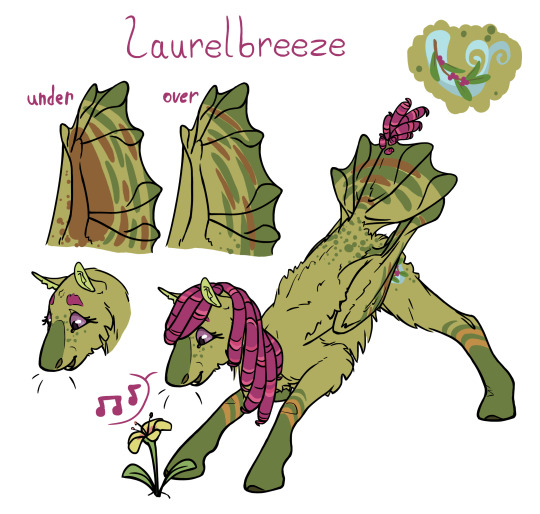
sooo remember how I said that my ponysona Willowsprout is basically a mix of Fluttershy and Treehugger in terms of personality and magic/talent? well unfortunately, my ponysona doesn’t physically match them-- a unicorn resulting from a pegasus + earth pony doesn’t make much sense, nor does her white/green palette compared to their respective yellow/pink and green/red. so I couldn’t rly justify making Fluttershy and Treehugger my ponysona’s parents, despite how much I’d like to (at least in terms of genetics, but perhaps raising..)
but THAT got me thinking abt what a genetic child b/t those two would be like, and I accidentally made another oc I’ve kinda fallen in love with :’)
so here’s Laurelbreeze-- a pegasus/earth pony bicorn, much like Fluttershy herself (in my lore, at least)! Laurel’s talent and personality overlap w/ Willow’s a lot, considering they both were conceived under the idea of being my personal ponysona, but Laurel diverges a bit from my ponysona and into his own character in interesting ways, I think. besides the obvious physical/magical differences b/t pegasi and unicorns, Laurel’s Talent is far more pointed, with a stricter focus on plant life, whereas Willow’s is more broad-scope ecology, which includes both plants and animals. Laurel also takes a bit more after Fluttershy in terms of shyness, while Willow is *slightly* more stable, lmao
anyways, I’ll put some more detailed info abt Laurelbreeze under the cut b/c I’ve gotten far too invested in him ;w;
Name:
Laurelbreeze. most folks call him Laurel, but Fluttershy calls him Breezy, in cutesy reference to her own brief history with breezies. this nickname has caught on w/ Discord, Treehugger, and even some of Laurelbreeze’s friends, much to his embarrassment
(.... I forgot Fluttershy’s bro has ‘Breeze’ in his name, idk how she’d feel abt it being part of her child’s name.... oh well, I like this name way too much now)
Class:
legally pegasus, actually a pegasus/earth pony bicorn (my lore for bicorns here)
Parents:
Fluttershy and Treehugger birthed Laurel, and Discord also raised him alongside Fluttershy. he mainly lived with Fluttershy in ponyville, but often took trips to Discord’s dimension, or treks out into the wilderness with Treehugger
I like to imagine Discord/Fluttershy/Treehugger in a loose poly “angle”, where Discord/Fluttershy are a solid romantic pair, while Fluttershy/Treehugger sort of vacillate b/t close friends and partners. Discord, despite his tendency towards jealousy, has come to affectionately tolerate(?) Treehugger, and is happy that his wife is happy with the both of them
Special Talent:
since Laurel’s magic took more strongly after his earth pony side, he doesn’t have strong connections to air/wind magic like full-blooded pegasi do. what little he does have, however, is uniquely woven with his earth pony magic for a very unique talent
much like Treehugger’s ‘relaxing’ melodies, Laurel can manipulate his voice to hit the ideal magical soundwaves to promote plant growth and health. Laurel’s soothing tunes can help even the least productive crops or dying forests flourish in just a few day’s time. (look I know plants can’t hear, I know it’s a myth, let me have this)
Laurel owns a greenhouse in Ponyville, selling lush greenery to anypony interested (the “Flower Sisters” are regular customers, bulk-buying what Laurel grows and reselling them in beautiful arrangements). he also works as an on-call botanical “nurse”, visiting any farms or natural areas that are in need of a health/growth boost
Cutie Mark:
laurel branch being lifted up on a gust of wind
Personality:
Laurel is very shy, generally hanging around the outskirts of crowds/groups and barely speaking up. he’s prone to sprinting off to the nearest bush or swooping up into the nearest tree when he gets overwhelmed with social contact.
Laurel’s far more open with friends, but it takes several months of regular contact to hit that point of trust. once he’s finally comfortable with someone, he turns surprisingly open and tactile, playfully bumping flanks as greeting, or casually draping his wing over a friend sitting close by. he also talks more animatedly, willing to ramble about plants when he knows he won’t be judged beyond a playful tease or two. especially close friends are even lucky enough to hear Laurel openly sing for them
while other ponies generally set off his anxiety, plants are Laurel’s safe-haven. he talks most openly with his plants, holding casual conversations and spilling all his anxieties to their patient ‘ears’
Hobbies:
singing is not merely a job for Laurel, but a passion rivaling that of his interest in flora. he’s always got a new song unfurling in his head, and he’s prone to singing to himself when he’s working out lyrics and melodies. he tries to restrict himself to softly humming when in public so that he doesn’t draw attention to himself, but he sometimes loses himself to the music and ends up outright singing. when he comes back to himself, he may find an eager audience requesting more, but he’ll usually sprint off in a nervous frenzy. his friends and parents try to encourage him to open up and share his music, but he’s still too shy at this point. at the very least, he loves his jam sessions with his moms, even if their various tones and styles clash in rather... interesting ways
Discord instilled in Laurel a love of the confusing and bizarre, even if he didn’t necessarily succeed in turning Laurel towards the chaotic. Laurel’s memorized dozens of riddles and tongue-twisters, and delights in recounting them to friends, to their great frustration. he’s even put some of these riddles to a tune, making for entertaining, mind-boggling ballads
due to his obviously intense interest in flora, Laurel has an extensive collection of botanical journals/textbooks that rivals even the botany section in Twilight’s library. besides botany, Laurel rather likes mystery novels and accounts of unsolved/weird events
Physicality:
Laurel physically takes after his pegasus side, so he’s rather tall, with a compact torso and thin legs. he inherited Fluttershy’s particular height, and towers over most ponies, even other pegasi. he’s not necessarily imposing, however, due to his personality and thin build-- most would rather describe him as gangly and colt-ish
Laurel’s wings are elliptical, with a low aspect ratio, high loading, and rounded wingtips. theoretically this would make for high maneuverability and burst speed. however, since Laurel has little control over air magic to account for relative pegasi wing size, he can’t fly all that well. he’s much more comfortable earth-bound anyways, so he hasn’t trained his wings much either. he can make short trips across town, or shoot up a tree when he’s spooked, but much else is beyond him
5 notes
·
View notes